

BUILDING A DREAM


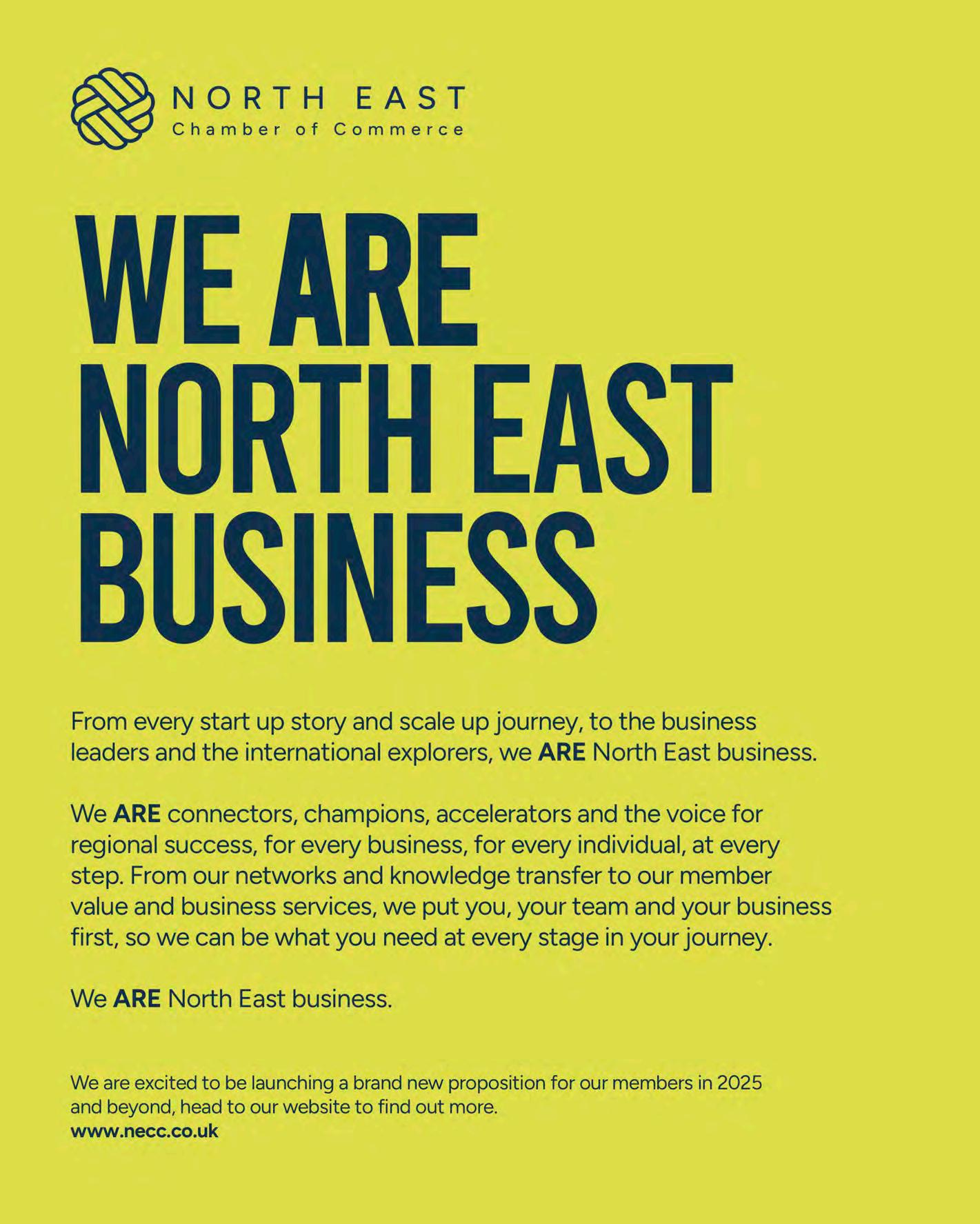

Big Question
From headline welfare cuts to increased defence spending and a crackdown on tax avoidance, Chancellor Rachel Reeves described her recent Spring Statement as “a serious plan for growth… and a serious plan to renew the country.” But how do you assess the blueprint? Will the moves spur fresh economic prosperity, or has Westminster’s fiscal chief overlooked more pressing priorities?

Roundtable
As North East mayor Kim McGuinness continues to introduce policy to shape the north of the region’s £4.2 billion devolution future, attention intensifies on the measures required to catalyse significant economic and social progress.


Out of office
In the latest instalment of a series exploring businesspeople’s lives beyond the workplace, Steven Hugill speaks to Dr Sam Whitehouse and Professor Carrie Ambler, chief executive and chief scientific officer, respectively, at Newcastle-based life sciences firm LightOx. Here, they reveal how they combine their time overseeing LightOx’s development of light-activated treatment for early-stage mouth cancers and a light-based, antimicrobial treatment for wounds with a passion for motorcycling.

CREDITS
HEAD OFFICE
The Stamp Exchange, 7 Westgate Road, Newcastle, NE1 1SA
All rights reserved. Reproduction, in whole or in part without written permission, is strictly prohibited.
CIRCULATION:
To confirm our circulation, please contact Chris Westwood, of Buxton Press, via chriswestwood@buxtonpress.com
To amend your mailing address or remove yourself from our mailing list contact hello@netimesmagazine.co.uk
CONTACT: @NETimesmagazine www.netimesmagazine.co.uk
PHOTOGRAPHY:
All photos taken by N staff are copyright North East Times Magazine Ltd, and are taken solely for use in N or products published by North East Times Magazine Ltd.
If you wish to use or publish a photograph taken for N, please contact pete@netimesmagazine.co.uk
Editor Steven Hugill steven@netimesmagazine.co.uk
Business journalist
Colin Young T: 07808 974 533 colin@netimesmagazine.co.uk
Business development director
John Duns T: 07920 152 523 john@netimesmagazine.co.uk
Creative & managing director
Peter Mallon T: 07590 064 800 pete@netimesmagazine.co.uk
Partnership & marketing manager Sarah Law sarah@netimesmagazine.co.uk
STRATEGIC PARTNERS


ADVERTISING CHARGES:
There is a £25 charge for every set of amendments, following the first initial set of amendments, which is free of charge for adverts designed by North East Times Magazine Ltd.
CANCELLATIONS:
If an advert is cancelled by the booker within a seven day period prior to our print deadline, the advert will be charged in full, plus VAT.
EDITORIAL:
Editorial must be received by the 9th of the month or no responsibility is accepted for errors. The opinions expressed in this issue are not necessarily the views held by North East Times Magazine Ltd.
ADVERTISEMENTS:
Although every care is taken to ensure accuracy, the publishers regret that they cannot accept responsibility for loss or damage caused by an error in the printing or damage to, loss of artwork, transparencies or photos.
COMPLAINTS:
Regarding advertisements will only be considered for up to a week after publication. Advertising must be received by the 12th of the month. No responsibility is accepted for errors.
Digital marketing consultant
Sian Anderson sian@netimesmagazine.co.uk
Finance manager Jill Brown jill@netimesmagazine.co.uk
Events and PR consultant
Kirsty McCann kirsty@netimesmagazine.co.uk
Event managers Lesley Hampson lesley@netimesmagazine.co.uk
Dawn Owens dawn@netimesmagazine.co.uk
PRINT:
N is printed by Buxton Press Limited, the multi awardwinning printer based in Buxton, Derbyshire, which specialises in the sheetfed lithographic printing of magazines, brochures and programmes.
N is produced using vegetable-based inks combined with advanced innovative chemical-free plate and Heidelberg press technology and is printed on paper sourced from well-managed, sustainable forests.
Buxton Press is certified to ISO14001 and ISO9001 Standards, holds FSC® and PEFC Chain of Custody certification, offers Carbon Balancing via The World Land Trust and is currently working towards becoming a Carbon Balanced Printer.

Filmography Andrew Lowe andrew@netimesmagazine.co.uk
Paul Geist paul.geist.photo@gmail.com
Photography in this issue: Andrew Lowe andrew@netimesmagazine.co.uk
Jamie Haslam www.roamwithus.co.uk
Angela Carrington www.thisisthebiggerpicture.co.uk
Matt Taylor www.mtcreative.co.uk
@2025 Published by North East Times Magazine Ltd.
Contributors:
Vicki Henderson
Jon Dudgeon
Stuart Miller
Elaine Stroud
Ian Kinnery
Dave Meldrum
Stephen Patterson
Sam Whitehouse
Carrie Ambler
John McGee





There’s a lot of talk in the business world, but sometimes it pays to stick to the basics. Here, Steven Hugill highlights the importance of resilience and how its value is reflected in this issue…
Hello and welcome to the latest edition of N magazine.
As recent months have again reminded us, the commercial world is many things: fast-moving, fiercely competitive and forever at the mercy of the next political tremor.
It is also a breeding ground for nonsense, for hollow buzz phrases and the increasing insipidity of self-titled business gurus serving up social media word salads dripping in artificial intelligence dressing.
In business as in life, sometimes it pays to keep things simple.
It also pays to be resilient, to balance the highs and inevitable lows with rationality and to remain grounded when the next so-called success hack promises to take off.
Resilience was certainly a trait Amanda Staveley – who graces the cover of this issue – had to call upon when leading the protracted takeover of Newcastle United.
Now, the contrarian might argue it is much easier to remain spirited when you have substantial Saudi Arabian backing at your shoulder.
But as Amanda reveals in an exclusive interview, resilience – and a little pep talk from Ant and Dec, no less – was just as crucial to getting the deal done.
So too was it integral to the club’s running in the aftermath of Mike Ashley’s departure, when Amanda, alongside her fellow new owners, sought to address the fortunes of a team treading water in the Premier League’s piranha-filled pool.
She admits the challenge of replacing a manager and refreshing a squad of players – all while navigating changes to the league’s financial frameworks – was tough, with pressures that often felt all-consuming.
But when the club lifted the Carabao Cup recently, ending decades of waiting for a major trophy, that hardiness was more than repaid.
Walking away from a university education also requires resilience.
But that’s exactly what Dominic McGregor did when he joined forces with Steven Bartlett to launch social media marketing agency Social Chain.
Today, the brand is a household name, working with a good many
similarly recognisable organisations. It wasn’t always that way, though.
Already toying with the prospect of returning to his studies, Dominic was forced to call upon even more resilience as he and Steven lived in a client’s London office for a number of months while Social Chain rose from the ground.
Today, he is transferring those experiences to Fearless Adventures, the investment fund he has co-founded to equip tomorrow’s business leaders with the financial backing – and the mental toughness and belief – needed to succeed.
And with plans to extend Fearless Adventures’ training and education academy further into the North East, Dominic tells N magazine he is excited at setting more entrepreneurs on their commercial journeys.
Finally, this edition officially unveils NET 250, our exciting new endeavour that highlights the region’s top 250 businesses by turnover – head to the middle of this magazine for a special pull-out booklet containing the full list and category winners.
Researched in partnership with Newcastle University Business School and verified by global professional services firm PwC – using publiclyavailable data from Companies House accounts and business websites – NET 250 showcases the breadth and depth of our region’s commercial sector and the organisations delivering tomorrow’s successes today.
It also further reinforces our commitment to the region’s business community.
Here at NET, we’ve long prided ourselves as being an authoritative voice that champions – with reasoned argument – the North East’s business landscape and the measures needed to drive greater success.
And through NET 250 – alongside our flagship investment campaign VISION 31, our national news website Bdaily, our high-level events calendar and this very magazine – we’ve strengthened those calls even further, creating a directory of the companies leading change and the many investable opportunities therein.
I hope you enjoy this issue.
Steven
‘A BUBBLE OF OXYGEN FOR BUSINESSES TO THRIVE’

The North East’s business landscape is a growing international powerhouse, with nextgeneration innovations and a collaborative spirit making it an increasingly sought-after investment hotspot.
That was the overriding message from multiplatform publisher NET’s latest VISION 31 panel event, which gathered business leaders and industry experts at Sunderland’s City Hall.
Nearly 80 guests packed into the Wearside
www.netimesmagazine.co.uk
LinkedIn: North East Times
in-chief Steven Hugill – the theme could not have been clearer: while the North East could do more to champion itself, it is also a region that offers a truly unique proposition, primarily because of its people and their indefatigable spirit.
As highlighted in a previous VISION 31 London summit last year, the defining message of the day was not why businesses should invest in the North East, but rather, why would they not?
The first panel, titled The North East: A launchpad for growth, showcased regional
of Thomas Cook stores in 2019, spoke about how the foundations and ethos of the business remain firmly rooted in the North East.
She said: “We have built a business which is primarily based on the young people of this region, supported by the schools and our colleges and universities.
“They have built the business from the £812 we started with in the first year, to turning over £3 billion in our total transaction value.
“The characteristics of the region’s people and the ‘work hard, play hard’ ethic is something
This is an abridged version of the full event report, which you can read on the Bdaily website by visiting www.bdaily.co.uk
which differentiates us, and our sense of identity is unique.”
The sentiment was shared by Carole, who spoke about the reasons why Cundall - which was founded in 1976 in Newcastle and has since expanded to 28 offices employing 1300 people around the world - will always view the North East as ‘home’, having recently announced a move to new headquarters in Newcastle’s Bank House office building.
She added: “We still find the North East is a really fertile hunting ground for talent, both in terms of engineering and technical talent, but also with our back office functions, as the vast majority of our central services are still headquartered in Newcastle, as is our finance team, our marketing team and our IT team.
“This is partly because it is more affordable to put people in the North East, but it’s not just a cost-driven decision.
“The quality of the people and the calibre of the people is second-to-none, and it compares favourably to what we see around the world.”
Ed also spoke about Atom’s recentlyannounced headquarters move to Newcastle’s Pattern Shop and how the move reaffirmed the digital savings and mortgages provider’s commitment to the region, maintaining its promise to early investors that “the mind, management, headquarters and the heart would remain in the North East”.
The second panel – The North East: A smart investment – included insight from Ben Shaw, head of space operations and capture at aerospace firm Lockheed Martin UK; Clare Loveridge, vice president and general manager of Europe, the Middle East and Africa at cybersecurity firm Arctic Wolf; George Paterson, vice president of product at electrification and powertrain component firm Turntide Technologies; and Lara Jones, director of client services and consulting at Motivait.
The discussion focused on the reasons why those businesses, all from different sectors and originating from outside the region, chose to invest in the North East.
Lara, who referred to Motivait’s decision to relocate its UK headquarters from Surrey to The Core building, on Newcastle’s Helix development, in the midst of the pandemic, was quick to identify the region’s relatively modest operating costs, its connectivity and the talent pool from its universities as major
pull factors, as well as the “amazing” work/life balance.
She added: “What you have in the North East is a bubble of oxygen for businesses, helping them grow and providing room to strategise about what they want to invest in, enabling them to be creative without any crippling pressures.”
In a similar vein, George referenced the “culture, attitudes and loyalty” of the region’s people being increasingly valued by outside investors, while Ben spoke of how Lockheed Martin chose the North East because of the opportunities it presented “to drive innovation, skills and growth” such as investing in the £50 million North East Space Skills and Technology Centre in collaboration with Northumbria University and the UK Space Agency.
The panellists added that while the region could do more to sell itself to potential investors, devolution offered an opportunity to take ownership of its own narrative and move forward with clarity around which sectors to focus on and how to broadcast and articulate its message.
Clare said: “We still do not shout loudly enough about what’s happening here.
“That’s one of the biggest challenges we have. “Everyone in this room knows how great it is, but if you ask people outside of the North East, their impressions probably remain what they
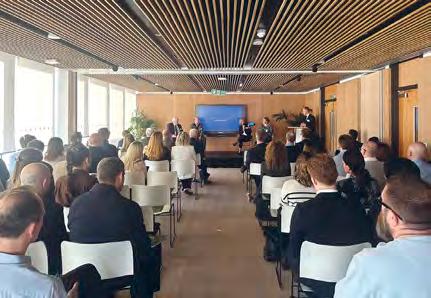
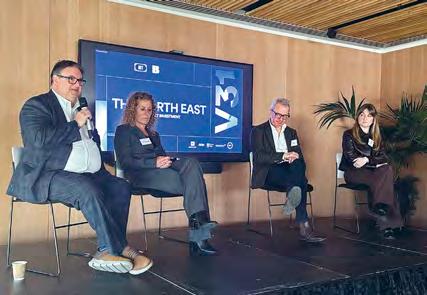
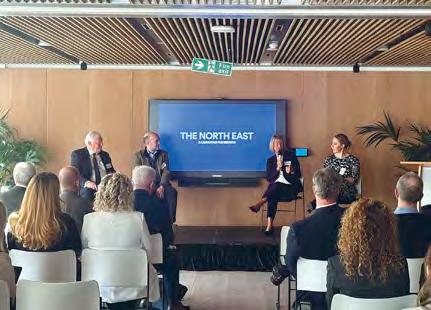


North East HR&D Awards shine a spotlight on region’s stars
North East HR&D Awards
www.northeasthrdawards.co.uk/ LinkedIn: North East HR&D Awards
The North East HR&D Awards return in June to celebrate the organisations and people professionals making a real difference across the region’s HR and learning and development community.
The countdown is on to this year’s North East HR&D Awards.
There are now just days to go until the showpiece ceremony takes place at The Fed, in Gateshead.
Celebrating the outstanding organisations and people professionals across our region, the event – now in its 17th year – promises to once again shine a spotlight on the stars of the region’s HR and learning and development community.
And following 2024’s fabulous Roaring ‘20s-themed spectacle – which attracted record attendance and a near 40 per cent rise in award submissions alongside new event partner NET – the stage is set for another unforgettable evening.
Taking place on Thursday, June 5, the ceremony, which is backed by headline partner TDR, will feature a diverse range of award categories.
Pete Mallon, creative and managing director of multi-platform publisher NET, whose portfolio includes N magazine and national daily business news website Bdaily, says: “We can’t wait for this year’s North East HR&D Awards.
“As an independent media organisation
dedicated to showcasing the dynamic stories of individuals and organisations driving change across our region, the ceremony is a natural fit for us and a real highlight in our calendar.
“Last year – the first with NET as delivery partner – was an incredible evening, and we’re working hard behind the scenes with organisers to create another memorable event.”
The 2025 North East HR&D Awards will be judged by members of the North East Work & Talent advisory board, who reflect a crosssection of expertise and experience from organisations across the region.
Elouise Leonard-Cross and Sarah Carnegie, North East Work & Talent advisory board joint chairs, say: “The North East is a unique and inspiring place to live, work and thrive.
“And the North East HR&D Awards showcase the work of people professionals across our region, and the organisations that are creating great workplaces and outstanding results.”
The 2025 North East HR&D Awards are proudly supported by a number of category partners, which include CIPD, Esh Group, Jackson Hogg, Northumbrian Water, NPH Group, Sullivan Brown HR Recruitment & MISay, the North East Chamber of Commerce and Womble Bond Dickinson.
Square One Law is the evening’s film partner, with Motivait the event’s digital engagement partner.
Talentheads and the North East Apprenticeship Ambassador Network are the evening’s photo booth and programme partners, respectively.


North East HR&D Awards
For more information about partnership opportunities or to reserve a table for the evening, contact Lesley Hampson by emailing lesley@ netimesmagazine.co.uk or call 07748 908058. Alternatively, email Dawn Owens at dawn@ netimesmagazine.co.uk or call 07789 666437.


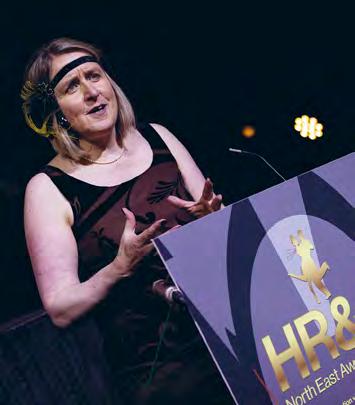




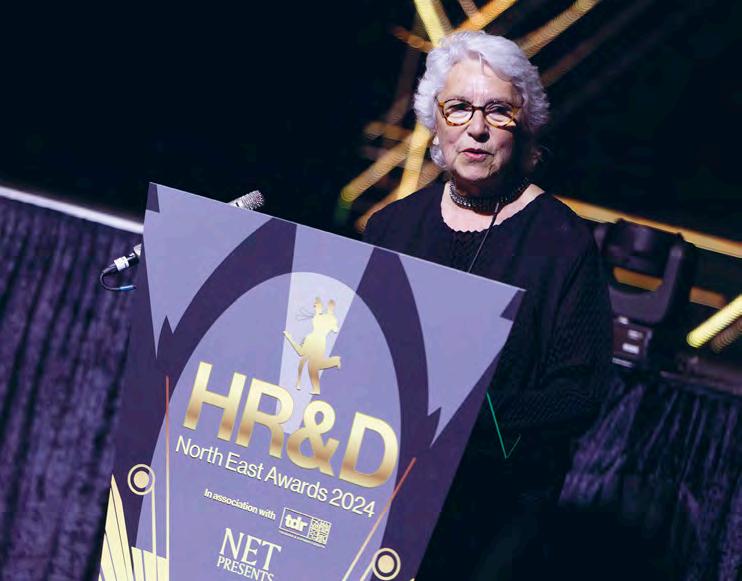

Reforging Britain’s steel future
By Steven Hugill

As the fallout from British Steel’s planned Scunthorpe closure continues, Steven Hugill examines the response needed to retain a crucial element of the UK’s industrial landscape.


Stage set? Check.
Lines rehearsed? Check.
Choreography nailed? Check.
Curtain up.
Hang on, what’s that clanking noise?
No, it’s not Britain’s latest blink-and-you’ll-missthem Eurovision Song Contest entry.
It’s the latest Government thrashing at the instruments and mouthing a few shouty lyrics on yet another A-side of the country’s difficult steel sector album.
What The Hell Just Happened!? Quite.
Jingye’s retreat from its Scunthorpe-based British Steel venture – in the process apparently kiboshing a proposed electric arc furnace to make greener steel of the future at its Lackenby plant, near Redcar – has hit repeat on the same track again.
Eye-watering energy prices. An unforgiving push for decarbonisation. A race to the bottom against markedly cheaper imports.
The steel sector is stuck on a loop, the needle perilously close to snapping.
Scunthorpe’s works, home to some 2500-plus jobs, is the UK’s last virgin steel-producing plant.
If it were to disappear, it would leave Britain as the only G7 nation without the resource to make the strongest form of the material essential for rail, construction and manufacturing needs.
That would mark a spectacular own goal for a country whose steel has been used to forge structures around the globe.
And in today’s world of changing political

alliances and escalating tariff tit-for-tats, for the UK – and its limping economy – to lose such expertise would do nothing for its reputation, let alone its bottom line.
The creation of the Steel Council at the start of the year does at least offer a semblance of a plan for meaningful change.
Backed by a £2.5 billion investment pot, Labour says the venture will unite industry figures, experts, trade unions and devolved governments to give the steel industry a longoverdue reboot.
But the council – co-chaired by industry veteran Jon Bolton, who holds a similar role with the Teesside-based Materials Processing Institute research and innovation hub – was founded before Jingye’s withdrawal, meaning the Government’s rescue act is already biting into its reserves.
Which makes it all the more imperative the venture takes concrete action on power prices, green investment, trade defence and procurement to protect an industry that remains the backbone of communities, not least in the North East.
From British Steel’s Teesside Beam Mill – which makes large steel sections for construction projects – to its special profiles plant in Skinningrove, east Cleveland – which makes parts for the construction, earthmoving, forklift and mining sectors, and has just opened a new £26 million service centre – its influence on thousands of pay packets is immense.
To continue securing those, and thousands more across the supply chain, the country needs a new set list, rather than a tired greatest hits medley.
And it needs it fast.
QUESTION
B G
From headline welfare cuts to increased defence spending and a crackdown on tax avoidance, Chancellor Rachel Reeves described her recent Spring Statement as “a serious plan for growth… and a serious plan to renew the country.” But how do you assess the blueprint? Will the moves spur fresh economic prosperity, or has Westminster’s fiscal chief overlooked more pressing priorities?
By Steven Hugill


Jon Dudgeon Co-founder and chief executive
Blu Sky Accounting
While the Chancellor’s Spring Statement demonstrates an intent to drive economic growth, the balance between cuts and investments raises questions about long-term sustainability.
For example, plans to raise £7.5 billion by combating tax evasion and avoidance signal progress towards a fair and transparent tax system.
However, adequate resourcing for HMRC is essential to ensure this increased enforcement does not cause undue frustration among compliant taxpayers.
In addition, reductions in welfare may negatively affect consumer spending, a critical driver of economic growth, and an area that directly impacts small and mid-sized businesses.
The statement also missed key opportunities to support SMEs, namely, by encouraging investment in research and development and early-stage businesses.
By enhancing research and development tax relief schemes, or increasing access to innovation grants, key growth drivers could have been boosted.
Plans to improve access to finance or support for working capital were also unaddressed, despite being vital for businesses to scale amid inflationary pressures.
There was no mention of direct investment in skills, apprenticeships or upskilling initiatives for the digital economy, which are crucial for SME competitiveness and long-term growth.
Ultimately, while the statement signals growth, it leaves businesses waiting for policies that directly support development, productivity and investment.

Stuart Miller Director Civil Engineering Contractors Association (North East)
As representatives of civil engineering contractors, we welcome the announcement of a further £13 billion over the course of this Parliament, though the benefits of this investment will only be felt once industry can get spades in the ground on projects.
We must do everything we can, at a local and regional level, to speed up decision making and planning while ensuring project budgets are realistic from the start.
I support the Government’s focus on infrastructure investment as a driver for growth as it creates well-paid, sustainable and secure jobs in our sector.
The further commitment to construction skills training is also welcomed.
There is an urgent need to recruit more apprentices, as well as experienced workers, and we will continue to champion that this sector offers ‘a job for everyone’, whether in a construction trade, a construction professional or a nonconstruction professional role.
Our sector can turbo boost economic growth if its potential is quickly unlocked.
To ensure this, though, project delivery must be expedited.
The North East has a track record of developing highly-skilled workers, who stand ready to deliver infrastructure schemes in the transport, energy, communications, waste and water sectors.
We keenly await the publication of the forthcoming Planning and Infrastructure Bill, which outlines commitments to speed up planning and remove other blockers to rapid project delivery.

Elaine Stroud Chief executive Entrepreneurs’ Forum

Ian Kinnery Founder Kinnery
Rachel Reeves likes to talk about growth, but I’m afraid her rhetoric is falling flat among the business leaders in our community.
Our latest survey revealed more than 80 per cent of Entrepreneurs’ Forum members lack confidence that the Government’s policies will lead to UK economic growth, which is concerning.
In fact, only two per cent of our members think Westminster has got it right.
Founders are angry their hard-earned profit is being swallowed up by tax increases, reducing resources to invest in growth plans.
Many entrepreneurs I speak to acknowledge the financial support they received during the COVID-19 years, and there is acceptance that business should bear some of the brunt of repaying this debt.
However, a tax on employment and family business succession is seen as a kick in the teeth.
While businesses are knuckling down and seeking to cut costs to compensate for the increased tax burden, they’ll also be keeping their eyes peeled for opportunities.
Investment in defence is likely to create gains in the North East manufacturing sector.
Business owners may also be more tempted to explore new markets such as the Middle East, given the stagnation of the UK economy and the unpredictability of the Trump administration in the US.
The Autumn Budget will prove as damaging as the one that ended Liz Truss’ reign.
The key differences are that the target was different and the timing of the impact was delayed.
You have to take the two events together.
From the start of the new tax year, businesses will suffer a double whammy of increased costs of employing people and less flexibility in terminating that employment.
There is no upside.
Businesses will have felt the impact in their April accounts.
The more savvy businesses, who employ big numbers of low-paid workers, have already cut large numbers of staff.
The facts seem to be contrary to growth aspirations, and the mood among businesspeople is as bleak as I have ever seen it.
The Spring Statement is no less negative, but is directed more at reducing benefit costs and boosting defence spending.
The actions seem to be in direct conflict with aspirations of growth.
One brighter possibility may be the benefit of greater investment in housebuilding and defence spending, which may generate a multiplier effect.


Creating leaders and workplaces of the future
Words by Steven Hugill
In today’s rapidly-evolving workplace, leaders must navigate the complex task of balancing technological advances against the challenges of generational diversity and inclusivity. To explore strategies to help develop a blueprint for these issues and more, Northumbria University and the North East Chamber of Commerce held the Leading The Workplace and Workforce Evolution event, which featured key insights from Joeli Brearley, Dr Helen Charlton and Aneela Ali.
Laying the foundations for a refreshed working environment
To stagnate in today’s fast-moving workplace is to surrender ground to relentless competition.
From perpetual technological advances to increasing flexibility demands and the challenge of managing a multigenerational workforce in a fiercely competitive labour market, staying ahead is essential.
To do so means embracing change, fostering adaptability and cultivating a culture that champions innovation and inclusivity.
For business leaders, it means redefining blueprints and reshaping operational frameworks.
And intrinsic to such, said Aneela Ali, North East Chamber of Commerce executive director – finance and corporate services, is a model rooted in greater transparency and collaboration, which strengthens emotional connectivity and empowers people to thrive.
She said: “We must create workplaces fit for the future.
“And the successful businesses will be the ones that listen to employees and strike the right balance.
“People today want to feel connected to the why of a business.
“Millennials and Gen Z are looking for more than a job title; they are driven by purpose and working for an organisation that matches their values, with diversity and inclusion more than just tick-box exercises.”
How can such change be implemented in an evolving commercial landscape?
In a world driven by capitalist principles, engendering such change presents somewhat of a challenging contradiction.
But, said Dr Helen Charlton, organisations – and their leadership teams – must move away from a long-held doctrine that identifies people as a homogeneous resource to be exploited for maximum gain.
She advocated a human-centred leadership approach, where sustainable value is driven by the unlocking of individuals’ potential, and success is defined through employee fulfilment.
She said: “The ultimate measure of success is happiness – humans, like plants, grow when given the right conditions.
“And human-centred leadership – a peoplefirst focus on employees, customers and communities, and a focus on empathy, ethics and long-term wellbeing over short-term gain –provides those conditions.
“It allows us to intrinsically motivate people, which delivers better results and organisational resilience,” said Dr Charlton, who is an associate professor and head of executive education at Newcastle Business School at Northumbria University.
Highlighting a model she coined fulfilment squared, Dr Charlton urged leaders to adopt a “transformational” approach that places strong emphasis on employee wellbeing and connection.
She added: “Fulfilment is where the promise of engagement pays off.
“We must move from passive avoidance leadership, and the very clear goals of transactional leadership, to transformational leadership, where you have individual consideration for every person.”
How can education play a role in helping employees thrive?
While breaking down the historic homogeneous approach, Dr Charlton said organisations and leaders must also remove the rigidity of job roles.
Where positions may have once defined an individual, she highlighted the importance of employees going beyond factory and office walls to learn fresh skills and competencies.
Demonstrating trust and belief in a person’s potential beyond their title, she said the tactic would drive personal development and significant innovation, which could be used to harness present-day productivity while informing future growth strategies.
She said: “Leaders who see potential empower their employees to grow beyond their on-paper roles.
“Businesses should use the Apprenticeship Levy to give opportunities to staff to develop their mastery.
“Cultivating autonomy and mastery gives people confidence and encourages curiosity, which leads to challenge and innovation.”
Aneela, who previously studied a senior leadership apprenticeship, added: “There is an imposter syndrome in all of us, but, through additional learning, we can empower people.”
One of the most significant workplace challenges is gender prejudice. How is this affecting the landscape?
Education. Job. Pregnancy. Unemployment.
It may sound stark but, said Joeli Brearley, founder of charity and campaign group Pregnant Then Screwed, 74,000 women lose their roles every year in the UK simply for telling their bosses they’re expecting a child.
The process, said Joeli – who was fired by her female boss via voicemail after revealing she was pregnant with her first child – is known as the motherhood penalty.
And until the practice is eliminated, and wider societal biases about women’s roles and responsibilities are revised, Joeli said the workplace will never attain the diversity of personnel, nor the empowerment of individuals and ideas, that businesses need to truly prosper.
She said: “Men are expected to bring home the bacon and progress their careers, while the woman’s role should always be about the children.
“And it has devastating consequences.
“My experience almost broke me.
“I lost everything overnight for doing something women have been doing forever – I dared to procreate,” said Joeli, who founded Pregnant Then Screwed in 2015.
She said: “I’ve heard stories of bosses telling women to have abortions, and of bullying and harassment that caused one woman to go into premature labour.
“And the motherhood penalty isn’t an inconvenience; it is a financial cliff.
“It isn’t about buying Asda-branded bread instead of a fancy sourdough, or going on fewer holidays – it is catastrophic for women’s quality of life.
“But it is catastrophic for children too because a woman’s income is directly tied to the health and wellbeing of their children.
“And it is also catastrophic for our economy and for business because we’re not effectively using the skills and expertise of the people available to us.”
How do mothers benefit the workplace?
Rather than seeing their skills base shrink, Joeli said mothers return to work with heightened problem-solving skills, greater resilience and a sharpened sense of empathy – each and all invaluable qualities for any business.
But by overlooking those strengths, she said leaders are continuing to preserve gender stereotypes while having an equally detrimental effect on companies’ output and success.
“Motherhood is a neurological and psychological superpower,” said Joeli, who was previously named one of British Vogue’s 25 Most Influential Women.
She added: “During maternity leave, a woman’s brain rewires and they return to work a different person.
“And those changes don’t just make them better caregivers.
“They improve decision-making and problemsolving; they enhance the ability to multi-task; and they heighten emotional intelligence, empathy and provide greater stress resilience.”
What steps should leaders and organisations take to remove the motherhood penalty and create an equitable workplace?
Joeli said leaders can kickstart change by introducing a structured blueprint that prioritises mothers’ wellbeing through policy including phased workplace returns, mentor support and reintroduction programmes.
It would also bring an end to office presenteeism, with mothers unable to “compete in the macho game of who is sitting in their
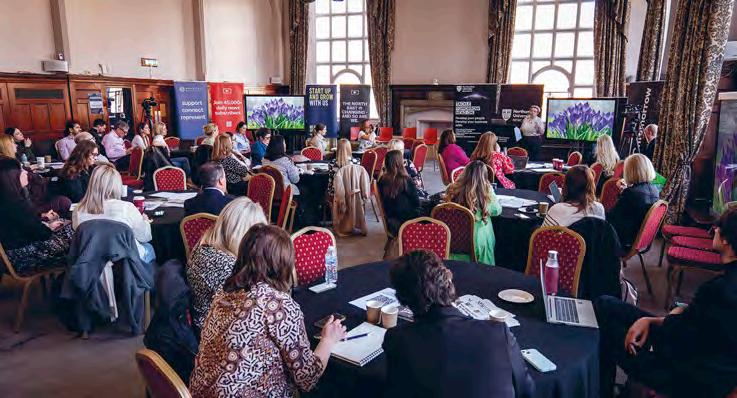

seat the longest because they have to collect children”.
Equally crucial, said Joeli, would be an offer of paid carers leave, which would say to a woman, “we’re not going to demote you because you need to care for your child”.
However, Joeli said change must extend beyond employers’ four walls, urging the Government to tackle “one of the most expensive and dysfunctional childcare systems in the world” and transform a paternity leave programme that is “the worst in Europe”.
This, she said – allied to organisational changes focused on removing the taboo of discussing career goals and caregiving – would have a marked impact on employee wellbeing and company success.
She added: “De-gendering care, by increasing paternity leave, improves retention and recruitment opportunities, and it also helps children’s educational progress, mothers’ recovery from giving birth and improves the likelihood of couples staying married.
“It is about modelling equality for the next generation.
“Mothers are powerful, essential and incredible employees – and the world will be a much brighter place when we end the motherhood penalty.”
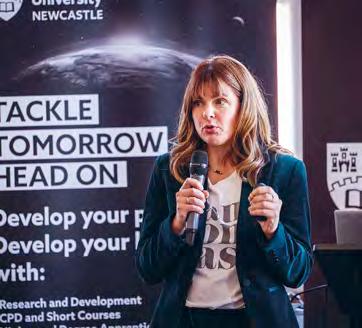
top, Dr Helen Charlton addresses audience members at the Leading The Workplace and Workforce Evolution event
Above, right, Joeli Brearley, founder of Pregnant Then Screwed
Above, left, Aneela Ali, Dr Helen Charlton, Joeli Brearley and event host Sarah Glendinning
Northumbria University
Discover how Northumbria University can support your journey towards empowering and transforming your leaders by visiting www.northumbria.ac.uk
This is an abridged version of a longer report on the Leading The Workplace and Workforce Evolution event. To see the entire article, visit www.netimesmagazine.co.uk


Entrepreneurs Abu Ali and Phil Williams made waves in the North East six years ago when they founded their eponymous corporate finance firm WilliamsAli. Taking on an underserved market, they quickly found success before attracting the attention of leading national advisory business FRP. Now partners at FRP’s Newcastle office, and operating as FRP Corporate Finance, Abu and Phil speak to N magazine about why they chose to sell, and how that decision has deepened their empathy for clients navigating the same journey.
When making big decisions in business –especially those tied to value creation and succession – having a trusted adviser by your side is key.
Even better is a trusted adviser that has walked the same path.
Phil Williams and Abu Ali, co-founders of independent advisory boutique WilliamsAli, have done exactly that.
Since founding the firm in 2019, they’ve advised business owners across the North East and beyond.
And now, having sold their business to FRP Advisory, they’re bringing first-hand experience to the table.
Today, as FRP Corporate Finance partners in the firm’s Newcastle office, they continue to work with their original client base while offering the broader capabilities of a national firm.
Phil says: “Becoming a part of FRP Corporate Finance levels up what we can offer to business owners across the region.”
He adds: “Our work remains fundamentally the same: we support ambitious business owners looking to grow, realise value or plan their next step.
“What has changed is the scale of resource and expertise now backing us in the North East.
“Our clients feel that difference.
“As business owners, that’s what we’ve gone through ourselves.
“We’re uniquely placed to look clients in the eye and say: ‘We’ve done what you’re about to do’.
“We know what it is to be a business owner that built something and then successfully have a value event.”
Abu and Phil met while working for a North East finance house, after training as accountants and gaining experience in consultancy and advisory roles.
Spotting a lack of specialist corporate finance support in the region, they launched WilliamsAli to fill the void, offering focused advice on mergers, acquisitions and funding.
Abu says: “All companies have trusted advisers and accountants they use through the annual life cycle of the business, but when you come to sell your business, you need a laser-focused mergers and acquisitions advisory practice.
“That was our aim with WilliamsAli, and it was received really well in the market; we had some interesting transactions and built a regional and national reputation.
“We have delivered a quality of advice and service, as well as a depth of expertise, that has become increasingly scarce in the North East after many national firms have retreated from the UK’s regions.
“We’re authentic and we have empathy with clients – we tailor our advice to what clients particularly need.”
That reputation attracted the attention of FRP Corporate Finance, which already operated in the North East through restructuring and insolvency teams.
Looking to strengthen its corporate finance offering, FRP saw Abu and Phil as the ideal partners to drive its growth.
Phil says: “While we were building WilliamsAli, FRP Corporate Finance was expanding into a truly national business, aiming to establish a presence across all regions by acquiring companies like ours in markets throughout the UK.
“We recognised the vision FRP was pursuing nationally and in the regions – it reflected the direction we were heading, just on a broader scale.
“FRP invested in WilliamsAli, but equally, we invested in FRP.
“We genuinely believe we’re part of something special, and we see that same mindset reflected in the people at FRP.”
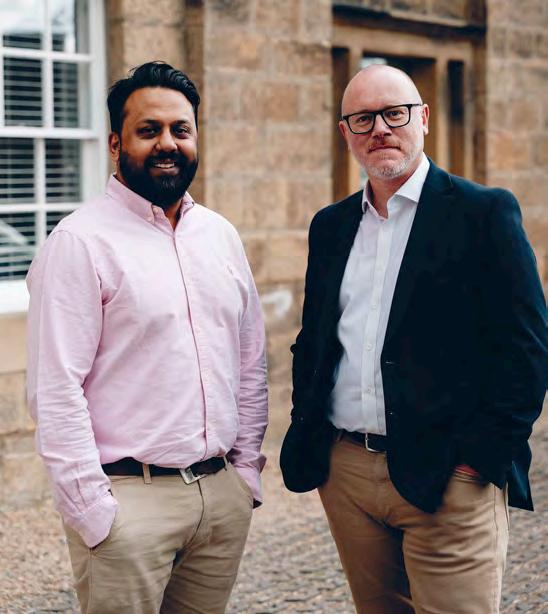
Abu adds: “We did a fantastic job in terms of building something new – the approach from FRP Corporate Finance gave us the chance to get the rewards for what we had worked so hard for, in the same way we help our clients.
“Of course, it wasn’t just about us, it was about what was best for our clients and our team in the long term.
“It was about maximising our place in the market and accelerating everything we’ve done with WilliamsAli.”
Now, with a strong team of nine corporate finance experts based in Newcastle, the team is looking to grow, with a core offer of five specialist services including corporate finance, debt advisory, financial advisory, forensic services and restructuring advisory.
Abu and Phil have become equity partners in FRP, and remain committed to their client base.
Abu says: “There’s nothing to stop us now.
“We’re continuing to grow our team and our market share, and expanding the services and skills we offer.
“Phil and I aren’t going anywhere.
“We sold our business, we did well from it, but it means we now get to do this because we want to do it – it’s what excites us.
“At the end of the day, North East companies like to work with North East advisers, people who understand the local market. And that is us.
“We are mergers and acquisitions advisers, who built a company from nothing, found success and then sold it and exited.
“We are unique in the North East in delivering corporate finance advice that is backed by the experience of having been through the same process as business owners.”
Phil adds: “We’ve been on the same side of the tables as our clients – we are not preaching or regurgitating a textbook. We’ve lived it.
“We’ve lived the risks and made the tough calls, with our families alongside us.
“That shared experience brings trust, empathy and a sense of purpose.
“It’s entrepreneurs advising entrepreneurs.
“FRP is full of talented people and driven by a culture of excellence – that is what we bought into.
“And we believe the future for FRP Corporate Finance in the North East is bright.”

“At the end of the day, North East companies like to work with North East advisers, people who understand the local market - and that is us”
FRP Corporate Finance
For more information about FRP Corporate Finance, and the services it provides, visit the website and LinkedIn page at the top of this article.

A legacy of skills development
TDR www.tdrtraining.co.uk
LinkedIn: TDR Training & Trust
With a history tracing back more than 140 years, TDR is woven into the fabric of the North East’s training landscape. Here, Li Xue, chief executive at the North East-based apprenticeship and upskilling training course provider, reflects on its journey and reinforces its commitment to creating new opportunities that will extend the region’s industrial legacy.
TDR is maintaining its tradition of being at the forefront of engineering, manufacturing and science training in the North East, having supported industry and shaped careers for more than a century.
Its story began in 1882, when pioneering Victorian engineer William Doxford founded the North East Coast Engineering Trust.
Doxford’s vision was to secure the future of engineering by nurturing skills across generations.
That legacy lives on through the TDR Trust, the independent charity dedicated to building a world-class skills base in the region.
A major milestone came in 2012 with the acquisition of TDR’s training centre at North Tyneside’s Quorum Business Park, which allowed it to expand and adapt to evolving industry needs.
In 2016, with support from British Engines,
TDR inherited the former Rolls-Royce Vickers training base on Scotswood Road – a site rich in local engineering history – further strengthening its capacity to deliver highquality training.
In 2022, TDR relocated practical training operations from Scotswood Road to its Quorum Business Park headquarters.
“We continually develop training facilities, equipment and training courses to develop the skills needed to compete”


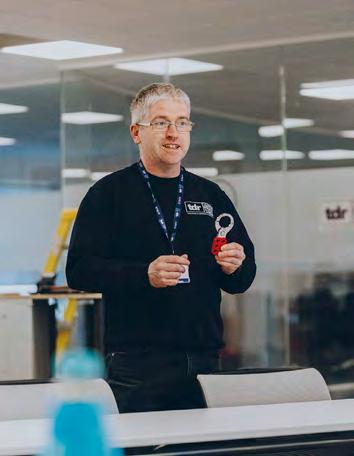
This brought facilities under one roof, creating a fully-equipped centre covering mechanical and electrical engineering, maintenance, turning, milling, CNC, hand fitting, welding and fabrication.
And under the leadership of chair and longstanding skills development advocate Olivia Grant, TDR continues to lead with purpose.
Olivia says: “Apprentices can become highly qualified engineers – a skill and role that enables long-term growth and vital opportunities.
“Our role is to foster and support apprentices and employers to ensure that.”
Today, TDR partners with employers, educational institutions and community organisations to deliver impactful apprenticeship programmes, industry-led
training and initiatives like the Dodd Technical Development Fund.
Ron Dodd, TDR president and respected engineering leader, has been instrumental in developing and advancing its mission.
He says: “To stay abreast of, and compete with, emerging technologies, innovation and global competition, as a nation we need to continually attract, train and develop engineers and scientists for the future.
“TDR’s ethos aligns with this, and we continually develop training facilities, equipment and training courses to develop the skills needed to compete.
“The ultimate beneficiaries of our programmes are employers and wealth creators in the North East and the UK economy.”
Despite changes over time, TDR’s mission
remains the same: to create opportunity, inspire future engineers and advance the North East’s proud industrial legacy.
Its motto – By Science, Industry and Honour – adopted in 1884, still reflects the values it proudly upholds today.
TDR
For more information about TDR, its curriculum and its trust model, visit the website at the top of this article.
WOR MANDY

Heartbroken, but ecstatic. Those were Amanda Staveley’s emotions as Newcastle United captain
Bruno
Guimarães ended 70 years of hurt by lifting
the Carabao
Cup at Wembley. The architect of the
Magpies’ takeover – alongside husband Mehrdad Ghodoussi
fan, having
– was there to see the drama unfold as a
stepped down from the club at the start of the season. Here, she takes Colin Young through an emotional day, her plans for the future and her journey to becoming the Queen of Tyneside.
It has been quite the start to the year for Amanda Staveley and husband Mehrdad Ghodoussi.
Saudi Arabia, Qatar, Abu Dhabi to keep a deal to buy another football club alive; Miami, for a business and trade forum hosted by US president Donald Trump; Los Angeles, for a conference on Huntington’s Disease; and then home to London before speeches for International Women’s Day in Newcastle’s Civic Centre.
And Wembley. There will always be Wembley. Nobody, least of all Amanda, will forget Sunday, March 16, 2025.
“It was just the most amazing day,” says the adopted Geordie.
She adds: “And the great thing was, we got to spend the day with the fans and celebrate.
“It was just incredible.
“Every part of the day was wonderful. I was crying. A lot.”
Newcastle’s Carabao Cup triumph ended 70 years of waiting for a major trophy for the city and the club’s supporters.
But it was still a case of what might have been for Amanda and Mehrdad.
The couple sealed the Saudi deal in October 2021, transforming Newcastle United into one
of the richest clubs in the world overnight.
Though the deal was far from an overnight undertaking.
It took years of negotiations with former owner Mike Ashley, and was their second attempt to prise the club from his grasp.
She had already played a role in Sheikh Mansour bin Zayed Al Nahyan’s purchase of Manchester City, when the Abu Dhabi royal family shook up the Premier League in 2008, and had attempted to buy a stake in Newcastle United in 2017.
Three years later, after leading a group on behalf of Saudi Arabia’s sovereign wealth fund, the Public Investment Fund (PIF), she owned ten per cent of the club, with the Reuben Brothers also securing ten per cent and 80 per cent going to PIF.
And after sacking Steve Bruce, the new board made the astute appointment of Eddie Howe, who steered the club to safety in five months and returned it to the Champions League in the following season.
The Magpies also reached the Carabao Cup final that season, losing to Manchester United.
As the club’s fortunes continued to change on the pitch, though, so too did they off the field, with Amanda and Mehrdad stepping down from their roles last summer.



Their love of the club, though, remains undiminished.
And there was no way they were going to miss Wembley, where they enjoyed the occasion with son Alexander in director Jamie Reuben’s box.
It was also the scene for reacquaintance with two other well-known figures of Newcastle United persuasion – Ant and Dec.
Amanda says: “They were next door, and to be there with them was very funny.
“I remembered the day they came to my house, when we were trying to buy the club, and we were very nearly walking away.
“We were about to give up. It had been dragging on for years, and I thought we were never going to get a deal.
“When they were leaving the house, they just said, ‘keep going, you will get there”.
“And Wembley was the time to thank them.
“I remember saying to Dec, ‘if you hadn’t said, ‘don’t give up!,’ I don’t know if we would have got there.”
Unlike the previous Wembley final, when Newcastle were outclassed by Erik ten Hag’s Manchester United, this time Howe and his players performed to perfection.
It really was the ultimate Geordie Day Out.
Amanda says: “We went down with the fans on the train, which was really lovely.
“The fans brought us into the deal. It was always about them.
“We fell in love with the club, we fell in love with the fans.
“That was an immediate thing, and it will never change.
“It was kind of like love at first sight.
“Eddie’s tactics were perfect, and I told him that afterwards.
“As a team, they were all fantastic, and it was nice to see them play so well.
“Apart from Chris Wood, who we sold to Nottingham Forest and has gone on to do great things, that was our team.
“All the fans were thanking us, and we felt so privileged to be part of it.
“Every fan was saying, ‘we can’t thank you enough – you’re Wor Mandy!’
“There were so many wonderful messages and I took a lot of selfies.”
You only have to spend a few minutes in Amanda’s company with Newcastle United fans in close proximity to appreciate their affection. It is quite overwhelming.
Indeed, during her appearance at an International Women’s Day conference in Newcastle’s Civic Centre, when she was a headline speaker following her participation in a roundtable discussion addressing female inequality, Amanda was inundated for picture requests.
She is ‘Wor Mandy’.
She says: “I always laugh when I hear that.
“I was talking to a big American billionaire recently, who had seen it on my Instagram, and he said to me, ‘why do people call you ‘Wor Mandy?’
“That’s the nicest, loveliest thing, because I really do feel at home.”
Throughout the painful and frustrating takeover negotiations, which stalled at the first attempt
eight years ago, it was such positivity from the Tyneside public that fuelled Amanda and her husband’s resilience.
Once the takeover was secured, however, there were still obstacles to overcome, not least Saudi Arabia’s human rights’ record and the nation’s treatment of women.
It is a question Amanda has faced, fronted and answered from day one – including during her visit to Newcastle when she addressed a room full of women.
She says: “PIF are great partners; I’m incredibly proud to be their partner in other areas and incredibly proud to work alongside them at Newcastle.
“When I came to the club, I knew there was only one really strong custodian who would actually be able to have the patience capital needed to build and deliver a football club that would invest in the city and community.
“It was really key to bring in partners that would allow the club to flourish.
“We fell in love with the club, we fell in love with the fans – it was an immediate thing”
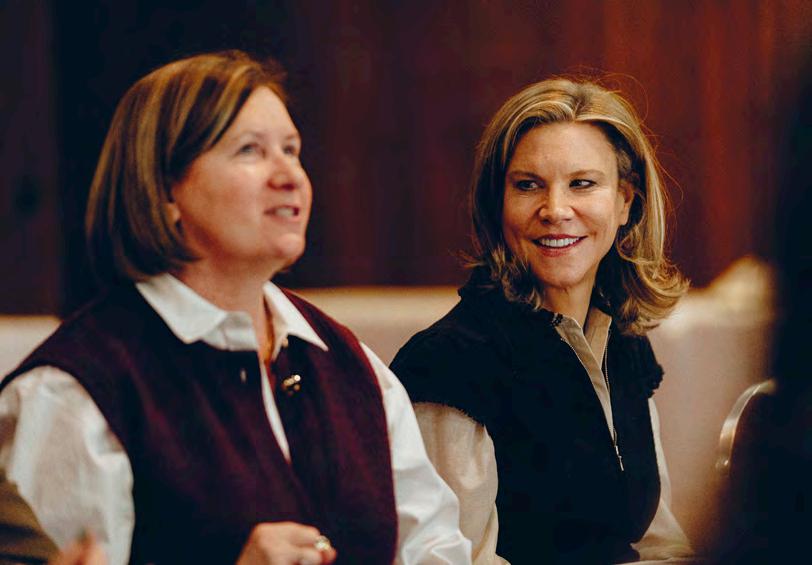
STAVELEY AMANDA

“It wasn’t just about our tenure or legacy.
“We were very conscious PIF was the main investor, and we wanted them to get the benefit, because sometimes I felt guilty we were getting the credit from the fans, and we were so proud to work with PIF.
“I appreciate and understand there are a lot of people who still have questions.
“What I’ve seen from my own experiences – bearing in mind I’m a northern girl who’s experienced huge changes in my own life – I’ve had the pleasure of going to Saudi and seen the massive change that’s happened to women’s lives there.
“We always have to look to the future, we can’t always look to the past and apologise.
“I knew what they would bring to this community would be extraordinary, so there was no doubt they were the right custodians going forward.
“To be able to work with them was a real privilege, but it was also kind of bittersweet, because we didn’t want to overstep, we were very careful in trying to understand our place.
“What was so nice for us was that we were able to run the club.”
Their brief time at the helm may not have resulted in silverware immediately, but progress on and off the pitch has been seismic.
Newcastle United is a different football club from the one they walked into four years ago; it has re-engaged with the entire city and region, from businesses to ball boys and girls.
Amanda says: “It’s hard for us now, because, it was just the most perfect time, to be able to do those few transfer windows and have the opportunity to do it as chief executive.
“But it was tough running everything.
“The first year was so hard, working alongside
PIF and Jamie, who worked equally as hard, because we had to make all the decisions on the football and make sure we signed the right players.
“There was so much on us, and we were so concerned we’d make mistakes.
“I’m a total workaholic. I love my work. I love my football.
“And it was just a huge thing; it’s seven days a week; you’re never, ever off whatever you’re doing, especially when you’re looking at players.
“It was very tough and very challenging, but we enjoyed every minute.”
Aside from laying the foundations for the Carabao Cup triumph, among Amanda’s greatest achievements is making the club a Living Wage Employer and establishing a women’s team, which won two successive promotions and, as N magazine went to print, just missed out on reaching the Women’s Super League.
Amanda says: “The men are doing incredibly well but to see the women’s team going from a collection of inspirational women who were being asked to pay to play to being promoted twice is really special.
“We have to encourage our families and friends to keep going to women’s football; we can’t take our foot off the gas – if we do, things will slow down.
“There is real momentum building around the women’s team.
“And we want that spirit to continue across the whole club, men and women.
“We really wanted to get a cup for the fans, to get to the Champions League again and felt we were responsible for that.
“That will never change.”
Setting the standard for 45 years
Todd and Cue
www.toddcue.co.uk
@ToddCue
Marking the completion of 45 successful years in business, Chartered independent insurance broker Todd and Cue is known for its quality and versatility in the face of an ever-changing market. Here, management team Mark Armstrong, Glenn Cue and Julie Rea speak to N magazine about its successes and the challenges and opportunities still to come.
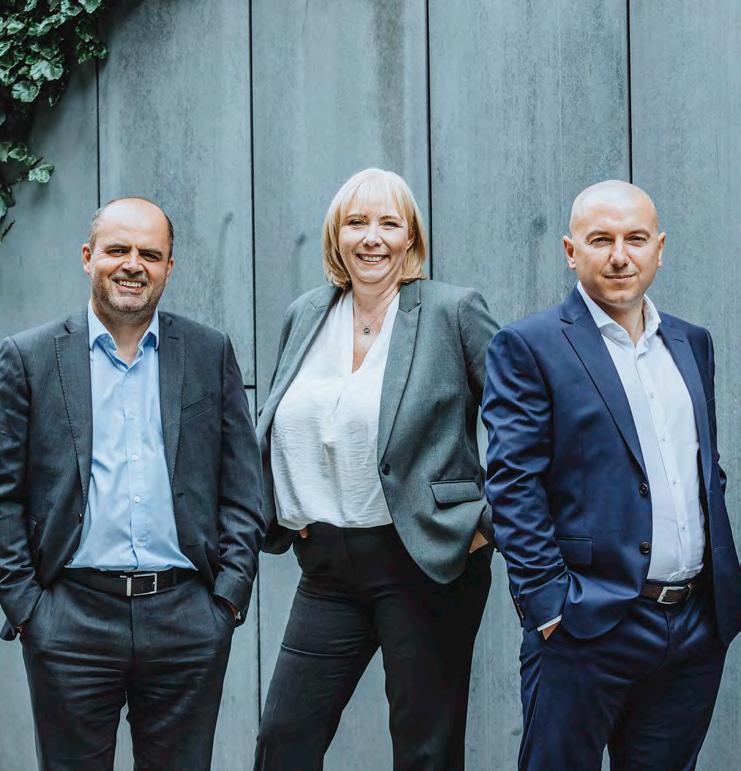
1979 – punk rock ruled the charts, Mrs Thatcher became the UK’s first female Prime Minister and Trevor Francis became the first £1 million footballer.
It was also the year Trevor Todd and Steve Cue, joined shortly thereafter by Chris Scott, founded the independent insurance broker that still bears their names today.
Fashions may have changed, and football’s transfer market now makes Francis’ record seem minuscule, but Todd and Cue remains a steadfast presence in the North East and beyond.
One of the UK’s leading independent insurance brokers, holding Chartered status, Todd and Cue prides itself on service and a client-first ethos.
Consistency has been key throughout – Trevor and Steve led the business for many years, with Steve and Chris then leading the business through the 2000s.
A management buyout in 2017 saw managing director Mark Armstrong and directors Glenn Cue – son of Steve – and Julie Rea assume ownership of the firm.
The trio speak with pride about Todd and Cue’s longevity in an increasingly changing market, and share a strong passion for retaining its independent status in a sector where merger and acquisition and consolidation activity is widespread.
Mark, who has been with the business for 20 years, says: “When the management buyout opportunity presented itself, we were all motivated to make it happen as we recognised the platform of Todd and Cue’s historic success.
“It also allowed us to continue on the independent journey.
“We all remain passionate about the role independence can play within the broking market.
“We’ve sought to build on the strong reputation Todd and Cue has historically enjoyed, primarily driven by our dedication to providing excellent customer service intent on delivering positive outcomes for all clients.”
The firm’s early days saw Trevor and Steve set up in a small office on Team Valley, Gateshead, with just one other member of staff – a typist.
Today, while still based on Team Valley, Todd and Cue operates from a much larger office and employs more than 30 people, with an in-house claims team working alongside brokers to offer clients a seamless service.
And with longevity comes success – in its 45th financial year, the business was delighted to report its best year to date.
Glenn says: “We’ve delivered on our intent as a management team and have grown the business, year-on-year, over the last seven years.”
For Julie, the commitment to independence brings a number of positives for clients.
She says: “From a broking perspective, we’re not tied in.
“We can choose an insurer and an option that suits a client and their specific circumstances, rather than working within centrally defined strategies.
“Another plus is that decisions are made under this roof and made quickly – that allows us to be more effective.”
Highlighting the numerous changes that occur within the risk management sector, the trio say the company is well-equipped to proactively manage emerging threats.
Julie adds: “Cybercrime would be one example
“The plan is not complicated and we will continue to push and build on what has been a good year, adapting where necessary to meet market challenges”
of where we have a sound understanding of the risk.
“Through detailed discussions with our client base, the take-up rate on this coverage has grown significantly in recent years.
“Another emerging risk will be artificial intelligence, and we are being proactive in ensuring we understand the implications for businesses and how that is aligned to insurance protection.”
Key to tackling emerging threats is Todd and Cue’s ethos of continuous improvement and development, which includes regular training for all staff, recognised by its Chartered status.
Glenn says: “Chartered status is a recognition of technical competence in the industry and requires a commitment to learning and development within the business.
“We take up any opportunity to provide training for our people – the vision is to have a team which is market leading when it comes to technical ability.
“We place great pride in having that status and view it as a real differentiator.”
So, what next for the business as it looks to the future?
Mark says: “The plan is not complicated and we will continue to push and build on what has been a good year, adapting where necessary to meet market challenges.
“We can only do that by continuing to invest in our team and working with our clients to understand the risks within each company’s business and, in turn, present bespoke insurance programmes designed to cater for those businesses.
“Customer retention, which is typically circa 95 per cent, will be key during these next 12 months.
“We are grateful for the platform we inherited, and are hugely proud to have celebrated 45 years of success.”
Todd and Cue
For more information about Todd and Cue, the services it provides and its support on areas including cybersecurity and artificial intelligence, visit the website at the top of this article, call 0191 482 0050 or email info@toddcue.com
EMG Way drives law firm’s continued growth
EMG Solicitors
www.emgsolicitors.com
LinkedIn: EMG Solicitors
Employee wellbeing is an increasingly important priority for businesses – and at EMG Solicitors, it is a core part of its culture. Through The EMG Way, the law firm is empowering its people to develop personally and professionally, while also supporting the communities it serves. Here, Jemma Morland, the firm’s co-founder and director; Richard Swinbank, director and head of conveyancing; and Ian Burke, head of people and culture, highlight how the firm is investing in its people for the long term.
When founders Emma Gaudern and Jemma Morland established EMG Solicitors in 2014, they had a vision for a different kind of law firm – one that delivered exceptional client service while offering a supportive and nurturing environment where colleagues could reach their full potential.
Fast forward to 2025 and EMG Solicitors now boasts five offices across the North: Durham, Newcastle, Darlington, Penrith and Manchester, as well as a new base in the South.
The law firm’s continued growth and success – which over the last year has seen colleague headcount increase by 16 per cent to 178, and revenue grow by 35 per cent – has been attributed to its ongoing commitment to ‘The EMG Way’.
The company-wide vision puts clients at the heart of its work and is driven by a passion to give back to the communities it serves.
Jemma, director and head of Court of Protection property and affairs, says: “We care about our clients and their best interests remain our top priority.
“It is the foundation of our practice.
“This approach has allowed us to attract some of the best talent in the industry and expand our services across the country.
“Our Court of Protection property and affairs team is one of the fastest growing areas at EMG Solicitors.
“With 50 colleagues, we are one of the largest independent Court of Protection teams in the UK, with our work nationally recognised through The Chambers and Partners UK Legal Guide.
“We also offer services in Court of Protection health and welfare, mental health, community care and education, and have a further 22 colleagues working in this area led by director Eilish Ferry-Kennington.
“From day one, our approach has always been about supporting clients, protecting assets and changing lives”
“Earlier this year, we welcomed departmental director Tim Bennett, who joins our director Rebecca Sparrow in the South.
“Tim’s appointment has helped strengthen our national presence and supports our growth plans.
“Owing to the talent and expertise in our Court of Protection team, I’m very proud of the service we’re able to offer our clients.”
Another area of growth is the firm’s residential conveyancing team, which supports clients in all areas of buying and selling property or land, including mortgages, refinancing, transfer of equity, preparation of auction packs and repossession, sale and purchases.
Headed by director Richard Swinbank, the team has grown from 23 to 31 colleagues over the past 12 months, something he puts down to the firm’s people-first approach.
He says: “Client excellence is a key priority, and to deliver that well, we need to make our people a priority too.”
Ian Burke, head of people and culture, adds: “To support our colleagues in their personal and professional development, we have invested in the design and delivery of a highly successful leadership programme, developed with our five EMG values at its heart.
“In the last month, we’ve seen 16 colleagues complete our year-long EMerGing Leadership programme, equipping them with the skills to progress in management roles.
“We’ve also supported a number of colleagues to complete our EMerGing Talent programme, which provides pathways for new colleagues and trainee lawyers to develop their legal careers at the firm.
“Our ongoing investment in our colleagues has
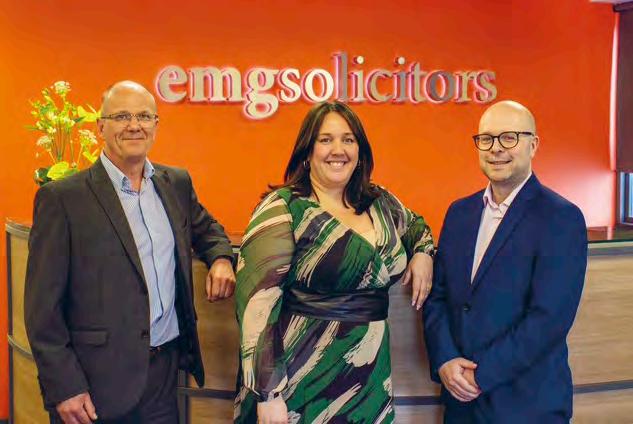
helped us achieve many accolades, including B Corp Status; Continuing Excellence status in the Better Health at Work Awards; winning Private Client Firm of the Year at the Legal 500 Northern Powerhouse Awards 2024; Investors in People (Silver); and featuring in The Times and Sunday Times UK list of 100 Best Places to Work 2024.”
EMG Solicitors also continues to support the professional development and quality of service within the legal sector.
In May, the firm will host its 11th annual Managing & Improving Your Catastrophic Injury Caseload Conference, in Manchester, designed specifically for those involved in managing complex and catastrophic injury caseloads, and supporting clients with catastrophic injuries.
The law firm will also mark another milestone in 2025 as it celebrates the tenth anniversary of its WonderLAN Ball, a charity event in support of Headway – the brain injury association.
Through the annual fundraiser, EMG Solicitors has so far donated more than £140,000 to the charity, supporting brain injury survivors and their family members, carers and volunteers to enjoy fun-filled activity weekends at the Calvert Trust, in Kielder.
A key part of EMG Solicitors’ growth plans is continuing its charitable support in the communities it serves.
With its own EMG Community Fund, five per cent of the law firm’s profits are donated to local charities, grassroots initiatives and voluntary organisations across the regions in which it operates.
“Client excellence is a key priority, and to deliver that well, we need to make our people a priority too”
Jemma adds: “I firmly believe the reason for our firm’s ongoing growth and success is down to living our values of co-operation, courage, excellence, integrity and kindness.
“From day one, our approach has always been about supporting clients, protecting assets and changing lives.
“It’s a privilege to make a difference for people, whether that’s helping them to buy their first home, ensuring they enjoy fulfilling and rewarding lives, or supporting initiatives that enhance their local communities.
“We’re here to make client’s lives better, and it’s that belief that drives me and my amazing colleagues to make EMG Solicitors the best we can be.”
EMG Solicitors
For more information about EMG Solicitors, the legal services it provides and the community support it delivers, visit the website at the top of this article or call 0191 500 6989.
ROUNDTABLE
How can the North East capitalise on devolution?
Creating
a blueprint for success across the north of the region’s new political landscape
As North East mayor Kim McGuinness continues to introduce policy to shape the north of the region’s £4.2 billion devolution future, attention intensifies on the measures required to catalyse significant economic and social progress.
Here, in the last of a sextet of executivelevel roundtable discussions hosted by N magazine publisher NET alongside Fairstone, the UK’s fastest-growing wealth advisory firm, business leaders set a template for mayor McGuinness and the North East Combined Authority to create lasting prosperity.
How can the north of the region fully capitalise on its devolved powers to drive business and economic growth?
From coalfields that breathed life into the engines of empire to the locomotives that stirred rail travel and superstructures symbolising the heights of human ambition, the North East’s industrial legacy is etched in earth and echoed in steel.
But if the region is to forge a new commercial chapter, roundtable members said it must create a fresh identity.
Lee Hartley, founder and chief executive of North East-headquartered Fairstone, which has 56 offices across the UK and Ireland, said: “We need identity and ambition.
“The combined authority’s objectives sound great, but I worry we might miss the opportunity.
Natasha McDonough, founder of Sunderlandbased MMC Research and Marketing, said: “Devolution provides us with a huge opportunity to attract global investment into the North East.
“We can get on an international stage if we really push forward with it.”
Nick Lane, infrastructure and government director – corporate finance, at global professional services firm PwC, said the North East Combined Authority needs to create a coherent identity from which it can drive forward.
He said: “There is a challenge around the role of the combined authority.
“Is it to inject cash into the region, or is it a voice to join up the region’s needs and present them for what is essentially an ask to the South?”
Words by Steven Hugill
This is an abridged version of the full roundtable discussion, which you can read by visiting www.netimesmagazine.co.uk
“Let’s not be diffuse; let’s pick the sectors where we have established players and really back them to succeed.”
The North East Combined Authority recently marked its first anniversary. Where has the regeneration body made progress, and what areas remain key priorities?
With foundations now sufficiently in place, roundtable members urged the North East Combined Authority to use its second year as a launchpad to deliver tangible industrial impact.
Participants called for greater clarity on business priorities, citing Manchester’s transformation from ‘Cottonopolis’ to a thriving advanced manufacturing and technology hub.
Is the North East’s funding and investment network sufficiently strong enough to help drive prosperity?
The North East Combined Authority has unveiled the £70 million North East Investment Fund, which bosses say could create as many as 2300 jobs – in the process supporting nearly 500 businesses and unlocking venture capital worth £350 million.
However, roundtable members questioned whether the move will extend far enough, instead advocating an “investment ladder” between early-stage, scale-up and mature businesses.
James Katirai, head of investments at Team Valley and Stockton-based investment management company NEL Fund Managers,
said: “There is a gap north of £2 million for the medium-sized enterprises that want to grow.
“We need to create a ladder of finance and an ecosystem that includes funds, banks and angel investors.”
Nicki Clark, chief executive at Durhambased national business support and funding organisation UMi, added: “There is still insufficient work being done to help smaller businesses through the process of securing the most appropriate commercial finance.
“A significant level of growth and economic benefit is presently capped because they are not equipped to access the finance they need.”
How does grant funding fit into this refreshed financial landscape?
Grant funding has long been woven into the fabric of business growth strategies.
But roundtable members cautioned that while well-intentioned, the practice can often be counterproductive, adding the combined authority’s objectives risk exacerbating the issue.
Mark Renney, founder of Newcastle-based tech firm Wubbleyou, which supports B2B service businesses’ innovation with web and mobile platforms, said: “We’ve been kicked back for grants before because our objective is not job creation, it is to create affluence.
“There is a massive growth opportunity with service businesses.
“If they were empowered to increase
productivity with tech and artificial intelligence, the potential is far greater than a manufacturer putting a £100,000 machine in to employ one person to operate.”
Brendon Hayward, joint managing director at offshore wind engineering firm Osbit, based in Riding Mill, near Hexham, added: “Vibrant, profitable businesses will invest in jobs, research and development and capital expenditure because they have the balance sheets to do so.
“But if you are giving them handouts from a growth pot, you’re not achieving anything.”
How can devolution help create a stronger skills landscape?
Roundtable members said the North East Combined Authority must serve as a pivot that connects research and education with industry needs.
Dan Monnery, chief strategy officer at Northumbria University, cited the Universities for North East England venture, which has united the region’s five higher education institutions under a single umbrella that is backed by the North East Combined Authority and its Tees Valley counterpart.
He said: “It has brought us together around a number of areas of common interest, such as supporting business innovation, driving social mobility and selling the region.”

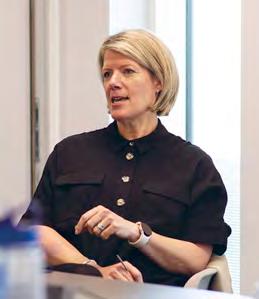
“There is still insufficient work being done to help smaller businesses through the process of securing the most appropriate commercial finance”
Nicki Clark, Chief executive UMi

“Let’s not be diffuse; let’s pick the sectors where we have established players and really back them to succeed”
Lee Hartley, Founder and chief executive Fairstone
Realising the true value of devolution
With May marking the one-year anniversary of Kim McGuinness’ election as North East mayor, how do you assess the progress made so far in driving forward the north of the region’s landmark devolution deal? Where has the regeneration figurehead –through the North East Combined Authority – delivered tangible impact, and what areas are a priority moving forward?

Dave Meldrum Chief executive Meldrum Group Trustee North East STEM Foundation
Progress made – but action still needed
The North East STEM Foundation welcomes the devolution plan as a vital catalyst for transforming the region’s approach to post-16 education, particularly in STEM (science, technology, engineering and maths) subjects.
The devolving of powers has brought a more responsive and ambitious framework for aligning education with the needs of the local economy and young people’s aspirations.
We do, however, feel there is still work to be done, mainly in having a more cohesive approach that replaces the current situation of colleges, university technical colleges and other education providers vying with one another for students.
The array of available qualifications needs harmonising and rationalising, and the routes into STEM-related careers simplifying.
Employers in the construction, manufacturing and technology sectors are seeing a real shortage of skilled workers, and the North East STEM Foundation would welcome a focus on introducing those roles with clearer, betterestablished pathways to younger students
earlier in their education journey.
There is a real opportunity for the devolution deal to make a significant impact if it can truly enable collaboration between colleges, training providers, employers and community organisations.
This would ensure pathways into STEM careers are more accessible and better aligned with the region’s industrial strengths and future employment requirements.

has been strengthened by locally-driven outreach, careers education and improved alignment between schools and further and higher education.
We are particularly encouraged by the emphasis on employer engagement and the role of local skills improvement plans.
These initiatives appear to have fostered deeper partnerships between education and industry.
Such collaboration is crucial to addressing skills shortages in industries such as construction, digital technology and advanced manufacturing – all key sectors for the North East economy.
Significantly, the devolution framework has
The result is a more inclusive and coherent post-16 landscape, which supports academic and technical routes into STEM.
The devolution plan has created conditions for a co-ordinated, place-based strategy for STEM education.
From the North East STEM Foundation’s perspective, this is essential, not only for meeting immediate skills needs, but for inspiring the next generation of scientists, engineers and innovators who will shape the future of our region.

Stephen Patterson Chief executive Newcastle NE1 Ltd
Building on strong foundations
It’s hard to believe it’s only been a year since the North East took the major step towards greater control of its future.
The world of 12 months ago is almost unrecognisable after (more than one!) shift in the status quo politically, economically and socially.
From the cost-of-living crisis and turbulence in global markets to major shifts in the world of work and skills, the pace of change has been relentless.
Against that backdrop, the steady progress made in our region feels all the more significant.
Already, we’ve seen the early signs of what strong, place-based leadership can achieve and what we can look forward to.
shaping its future.
In a volatile world, retaining a sense of local control matters more than ever.
Other regions have shown how increased local competence leads to more devolved powers, increased funding and responsibilities.
One huge opportunity for the region is in supporting young people into employment, especially those who don’t automatically see university and academia as their calling.
In an economy crying out for skilled workers in construction, clean energy, manufacturing, tech and hospitality, we can’t afford to leave this generation without clear, supported routes into meaningful careers.
the discussion
A prime example is how the mayor, working in lockstep with MPs and the local authority, rapidly intervened on the Gateshead flyover to re-open the Metro and adjacent traffic routes.
So too is the initial £8.6 million committed to making the case for investment in the Leamside Line, another first step in the journey towards better regional connectivity and a more joinedup transport network.
Although these are infrastructure projects, they’re about something bigger; providing leadership and a voice for the region, taking action and
This is where devolution can really make a difference, by working directly with employers and schools to design pathways that are grounded in the wealth of opportunity the region provides.
The past year has shown what’s possible when power is brought closer to home.
The challenge now is to build on those strong foundations, not just with more investment, but with long-term vision and a continued commitment to unlocking the North East’s full potential.

A legacy of learning: 80 years of meeting skills demands
Skilled people are the driving force behind every successful business. And for the past 80 years, Gateshead College has provided pivotal support that has given organisations access to a rich talent pipeline. Here, Colin Young charts the education provider’s journey to the present day, highlighting how its founding mission of serving industry’s needs remains at the core of everything it does.


Gateshead College first opened its doors to students 80 years ago.
Today, it operates from four campuses, including its Baltic Campus, which stands a gentle incline away from the River Tyne.
Its automatic glass doors are very different from those of its original base in Durham Road.
And it’s hard to imagine what those young men and women, emerging and learning from postwar Britain, would have made of the colourful sofas and television screens on whitewashed walls showcasing reels of pupils past and present.
But the ethos, drive and ambition of Gateshead College remain the same, and the desire to welcome students through those doors – and see them walk out as stronger and more confident people – will never change.
The college’s roots date back to 1920s technical evening classes under the Durham Road Technical School and Technical Institute banners.
Its story changed when Britain emerged from the Second World War.
Amid high demand for construction and manufacturing skills to help the country

rebuild, Gateshead Technical College officially launched in 1945 as an apprenticeship pioneer.
It did so alongside Team Valley engineering
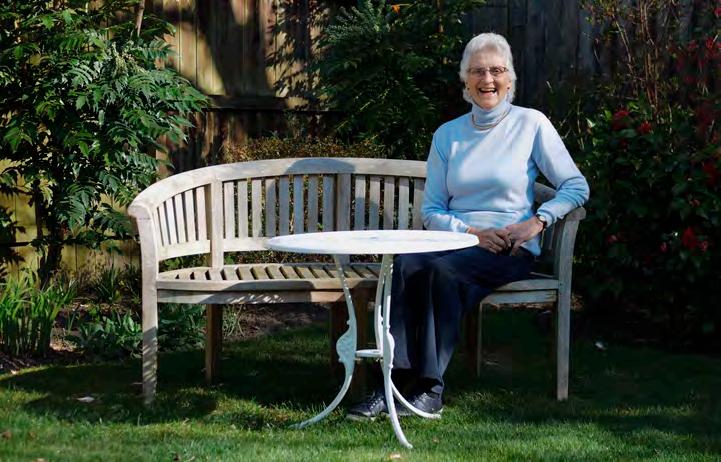
firm Sigmund Pumps, the company founded by Czech-born entrepreneur and inventor Miroslav Sigmund, who moved to Gateshead with his family in 1938 to escape Nazi invaders.
The business made pumps and Bren gun parts for the war effort before turning its attention to Britain’s workforce when the conflict ended.
Working with the college, Miroslav – also known as Mirka – set up the Apprentice Training Scheme for boys aged 14 and over, with the provider’s first apprentices learning their trade as fitters, turners and toolmakers on evening and day release courses.
In many ways, Miroslav was ahead of his time, but that shouldn’t come as a surprise given the businessman and inventor had more than 50 patents to his name.
Throughout her life, his daughter Helen Sherlock, who remembers him affectionately as ‘Pa’, has met and befriended many of the apprentices who came through Gateshead College and went on to work for Sigmund Pumps for decades.
She says: “His motivation initially was to expand the family business here and make it work, just as his brothers were sent to France, the US and Yugoslavia.
“To make it work, you need people, and he recognised you could do that through training people and offering them opportunities and some hope at what must have been an incredibly difficult time.
“And that’s when Pa’s common sense, philanthropy and kindness came through.
“He knew you get the best out of people if you
treat them decently.
“He created a family at home, and it sounds corny, but he created a family at work too.
“Everybody seemed to look out for each other and care for each other, there was always a feeling at the factory that ‘we’re in this together’, and he was like that all his life.
“I am so immensely proud of him and his legacy.”
Helen, who spent more than two decades accompanying her husband Nigel Sherlock in his Lord Lieutenant duties, is a frequent visitor to Gateshead College and has provided many historical documents outlining its connections to her family and Sigmund Pumps.
And her Pa, who died aged 96 nearly 20 years ago, would be proud of the links the college still has with the region’s young people and businesses through its modern apprenticeship schemes.
Helen adds: “It’s brilliant what the college is doing and encouraging for employers who are giving young people opportunities and training; it’s invaluable for the next phase of their lives.”
For Gateshead College principal and chief executive David Alexander, the education provider has always enhanced the lives of its students and the local businesses who have become an integral part of the success of its apprenticeships.
David, who has been the head of the college for four years, has been able to build on the strong ties between the college and companies across the region.
Gateshead College
To learn more about Gateshead College’s 80th anniversary, how it has responded to industry needs over the decades and its presentday courses, visit the website at the top of this article.
He says: “The post-war period was not just about giving people technical skills, it was about helping them get back into society as well, fulfilling their potential positively and contributing to the country, so it could emerge from terrible circumstances.
“And that ethos of providing life skills, and responding to businesses skills needs, continues to run through everything we do at the college to this day.
“And that won’t change.
“It’s about the number of opportunities we can provide, the number of businesses we can support and the lives we can change – and having the courage to go out there and do it.
“We want our students to be part of the community, to help that community thrive and fulfil their potential.”
One such modern-day student is Nimrah Sohail, a 19-year-old from Newcastle, who started a PlanBEE apprenticeship in September last year, and is currently working as an apprentice site manager for Sir Robert McAlpine, which has already given her experience of a placement with RPS.
The PlanBEE scheme is a collaboration between the college and more than 50

construction companies to develop a programme that acts as an alternative to university and prepares people for professional roles in architecture, engineering, building services and construction/site management.
And she says her eyes have been opened to the world of construction since she started the scheme.
She says: “A lot of people in my family went down the science route, but I’ve always liked understanding how things work.
“I’ve always been very curious and I like seeing the process and the end product.
“It’s brilliant what the college is doing and encouraging for employers who are giving young people opportunities and training; it’s invaluable for the next phase of their lives”
“I had a vision to go into engineering, work as a woman in STEM and break down barriers,” says Nimrah, who is also a UK ambassador for the Nike-backed Alpine Run Project, which encourages young people to take part in a training programme before tackling Mont Blanc at the ultra-running UTMB World Series Race.
She adds: “I like research, I love the massive infrastructure projects I’ve worked on, but I am creative as well, and I am looking forward to working in the design aspect of the course.
“I find it really cool seeing the outcomes and being a part of that process, rather than just doing drawings and not being on-site while it’s happening.
“I’m still doing placements and there’s still time to figure out what it is I really want to do.
“The college is really supportive; they come in on your placement, make sure you’re on target for year two and are there if you need anything.”


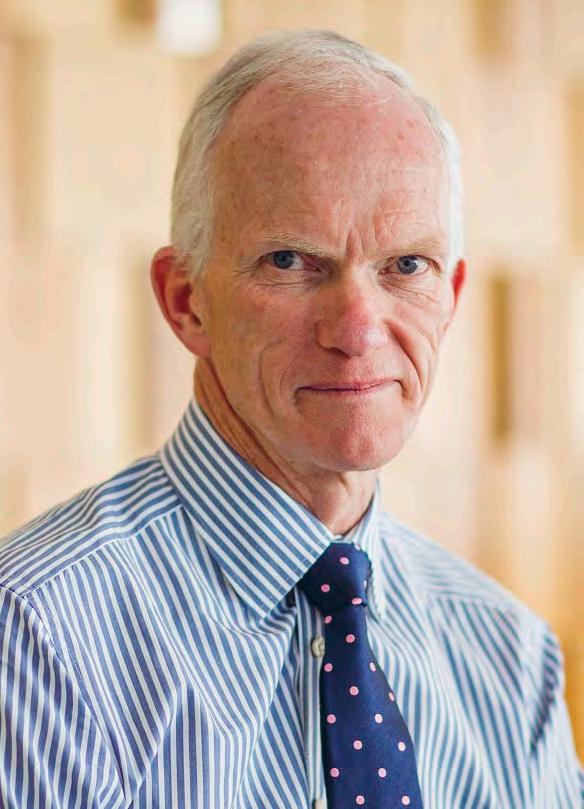
Stephen Welton is chair of British Business Bank, the Government-backed economic development venture providing financial support to smaller companies. Here, the Durham University law graduate tells Steven Hugill about the bank’s objectives, its efforts to simplify the financial landscape and its commitment to addressing a gender equity divide to help more female founders flourish. www.british-business-bank.co.uk
MINUTES
WITH STEPHEN WELTON
Tell us a little about British Business Bank and its goals
British Business Bank began with then Business Secretary Vince Cable more than a decade ago.
He had a real sense the UK needed an economic development bank, and its theme remains the same today: how do we get more capital into regions, while recognising there are very different companies?
When it comes to policies, one size doesn’t fit all, so the bank has a range of interventions.
The Northern Powerhouse Investment Fund II (NPIF II), which provides loans and debt finance from £25,000 to £2 million, and equity investment up to £5 million, is one of those interventions.
It has already supported several North East companies, including Seaham-based solar film maker Power Roll, Sunderland battery recycling firm Lithium Salvage and Stockton’s Southern Asset Management.
Equally, one of the most palpable interventions, in terms of human stories, is the bank’s start-up loan programme.
Funded by Government and administered directly by British Business Bank, it gives people, at 18 and 19, the ability to start a business, which is incredibly powerful.
However, you can only be a catalyst if there is somebody to catalyse, and we do that through our finance partners, which are our boots on the ground across the regions.
You have a deep connection with British Business Bank, having previously advised the Government on its creation. But what was your career path before you assumed the role of chair?
I worked at Barclays Private Equity in the 1990s, which gave me a chance to see what was going on in the regional economy.
The most powerful way to support the regional economy is to be there.
If you sit in a London ivory tower thinking about the economy, you’re going to get a very academic view.
Being on the ground is absolutely fundamental, and was a significant factor when, in 2011, I set up the Business Growth Fund.
That now has a strong regional presence, with offices across the UK and Ireland.
Many entrepreneurs remain frustrated by a complex funding landscape they say makes accessing support challenging. How can British Business Bank – and the broader funding ecosystem – help change that?
Making it really simple for a company to find access to finance is a perennial chestnut.
When you make things easier, you are fundamentally addressing time, which is the biggest and scarcest resource of all.
There are hundreds of thousands of companies, and not all of them are going to find it easy to raise funding.
Part of that is because they’re not sure of what type of funding is relevant to them.
And I think there is an opportunity with artificial intelligence to better connect people to funders.
This, in turn, would help strengthen the message; if businesses can see companies like themselves raising investment, they will want to find out how they did so.
And if you get more businesses taking the right type of finance, the impact on local economies is dramatic.
Despite female founders making increasing gains in the business landscape, they remain hamstrung by a sizeable gender investment gap, with male counterparts continuing to attract more equity. How is British Business Bank working to narrow that divide?
We are very committed to supporting female entrepreneurs – and that is more than a soundbite.
We previously committed £50 million to the
Investing in Women Taskforce - the £250 million initiative committed to increasing finance for female entrepreneurs - and recently announced a pledge of up to £30 million in THENA Capital’s UK MedTech Fund, which will back early-stage medical technology start-ups.
And it is something I’m personally committed to supporting, having recently given evidence to a Women and Equalities Committee focused on female entrepreneurship.
As a bank, we’d like to see new and different funds being created in the North East, and funds created by women, because female investors are a very powerful way to create more female entrepreneurs.
The Chancellor has consistently emphasised economic growth as Labour’s top priority during its time in office. How can British Business Bank contribute to achieving that goal?
In order for the economy to grow, we need more investment, and for more investment, we need more people to take risk.
The remit of the bank is to support small businesses, and the more we understand where the opportunities are, the more we can design our aim and activities around it.
NPIF II is a great example of driving investment, and we’re looking at the Government’s industrial strategy and opportunities around that in the North East.
We share the Government’s focus on growth.
But growth shouldn’t be an elite sport, nor should we define success by the next unicorn company.
It is about the hundreds of thousands of small companies that will be the UK’s engine for growth, and about helping people grow their businesses and fulfil their dreams because that is what motivates others.
A smarter way to protect the environment
Northumbrian Water Group www.nwl.co.uk/ @nwater_care
Northumbrian Water Group has launched a multi-million-pound project to reduce storm overflow spills across the region. In a UK-first, the provider is trialling smart sewer technology, which uses artificial intelligence and digital twins to move wastewater around networks to reduce flood risk. Here, the company reveals more about its tests, and why initial successes leave it primed to expand the process across the entire North East.
Wastewater pipes…
Not the kind of thing the average person tends to think about every day, and hardly a modernday Roman Empire.
However, scratch beneath the surface of the North East, and there are 18,600 miles of sewage pipes under your feet.
For context, that is the distance from Newcastle to Papua New Guinea and back, with some more to spare.
It would be easy to conjure up thoughts of spider-filled tunnels and gigantic old clay pipes filled with all sorts of unmentionables –including a dilute mix of sewage, rainwater, runoff from roads and fields, and water from sinks, showers and appliances.
However, in our region, that isn’t necessarily the case.
Northumbrian Water Group has supercharged its network into the 21st century, using a combination of highly advanced technology, such as artificial intelligence and digital twins.
As part of its continued commitment to reducing storm overflow spills across the region, it is pioneering an innovative technology known as smart sewers.
Launched in July 2024, the ground-breaking project uses artificial intelligence and sensors to help move wastewater around miles of pipes in real-time to balance the network – making them smart.

Here in the UK, storm overflows are used by all water companies during times of heavy rainfall to prevent sewer flooding in customers’ homes.
They act as a relief valve on the wastewater network, and are used with Environment Agency consent.
The trials, which have initially taken place in the Tyneside area, have shown it is possible to use technology to predict where in the region it is going to rain, and then move flows around the network to maximise capacity.
This is a UK-first project, the largest of its kind anywhere in the world, and it comes from right here in the North East.
It is based on incredible research and proven techniques used in the US.
In South Bend, Indiana, smart sewer technology was installed in a section of a wastewater network with the aim of reducing the number of spills from storm overflows.
Over a ten year period, spills were reduced by 80 per cent.
That’s why Northumbrian Water Group partnered with a team of tech experts at American company HydroDigital to make the concept a reality in the UK.
Despite already having some of the lowest levels of spills in the country, the water company has invested £20 million to set up and trial the project, connecting more than 800 sensors and sections of network to smart sewers.
And since February, the technology has been used against actual everyday conditions.
The clever tech operated on 15 separate occasions during rainfall over the course of that month, and every single one showed positive results in terms of stopping storm overflows that would have ordinarily spilled because of the weather conditions.
Due to the success of the trials, the company has spent a further £5 million to expand the project to Marske and Saltburn, in east Cleveland, and one day hopes to deploy the technology across the entire North East.
Director Richard Warneford, who leads the water company’s wastewater team, says the trials represent the start of what can be achieved with innovation in the sector.
He says: “This is an exciting and innovative project, which is set to completely revolutionise the way our network operates, and maybe even how our industry works as a whole.
“We are determined to be at the forefront of using clever and new technology to protect our rivers and coasts as much as possible.
“Northumbrian Water Group has supercharged its network into the 21st century, using a combination of highly advanced technology, such as artificial intelligence and digital twins”
“The fact we are seeing such positive results so early on is a great sign, and hopefully means we can deploy this further across the North East in the near future.
“Reducing the reliance on storm overflows is important to everyone who cares about our region, and we are proud to be leading the way.
“We look forward to seeing how the trials continue over the next few months as we expand into Teesside and east Cleveland.”
In March, Environment Agency data showed the number of storm overflows discharging in the region had reduced by 13 per cent in 2024.
The Event Duration Monitoring report, published by the Environment Agency, also showed the average number of spills per overflow has dropped from 30 to 26 in the last year, with a 12 per cent reduction in the total duration of spills.
In the future, the water company says it will invest £80 million to reduce the use of storm overflows and to upgrade the wastewater network between 2020 and 2025 – with a further £1.7 billion to be invested in a massive environmental programme between 2025 and 2030.
But smart sewers are not the only innovation project being worked on by Northumbrian Water Group.
It has many different ideas in the pipeline, from artificial intelligence water quality monitoring to using poo to fuel aircrafts.
A lot of these revolutionary ideas come from the water company’s Innovation Festival, which will return on July 7 at Newcastle Racecourse for its ninth year.

Northumbrian Water Group
For more information about Northumbrian Water Group, and the provider’s smart sewer trials, visit the website at the top of this article.
For more information about the water company’s Innovation Festival, visit www.innovationfestival.org or scan the QR code below

OUT OF
When you’re not in the laboratory overseeing the next phase of LightOx’s growth, you can often be found behind the handlebars of your motorcycles. What kickstarted your respective passions for two wheels?
Sam: It began when I was small. My dad had a Yamaha FZR1000 EXUP, which was the fastest bike on the road at the time.
I decided to learn to ride when my son was born.
He was premature and in hospital for a number of months, and as we couldn’t afford to get another car, I learned to ride.
Motorcycling is also where I met Andy Whiting, one of the founders of LightOx, as we used to go out riding and down to France for a week or so together.
Carrie: My love for biking started when I was eight.
My great-grandmother lived in a very small town in Kansas, and my uncle Elvin – who lived next door – had a moped.
I was allowed to ride it up and down the streets when I visited.
My mom also had a moped, a little 150CC motorcycle, in the 1960s as a teenager.
I always wanted to ride a bike of my own, but didn’t take lessons until I was 40 when my kids were older.
What was your first bike, and do you remember how much you paid for it?
Sam: My first ever bike was a V-Strom, although I never actually rode it.
I placed a deposit but when I returned to ride it away, it turned out the garage had double
In the latest instalment of a series exploring businesspeople’s lives beyond the workplace, Steven Hugill speaks to Dr Sam Whitehouse and Professor Carrie Ambler, chief executive and chief scientific officer, respectively, at Newcastle-based life sciences firm LightOx. Here, they reveal how they combine their time overseeing LightOx’s development of light-activated treatment for early-stage mouth cancers and a light-based antimicrobial treatment for wounds with a passion for motorcycling.
booked and sold the bike to someone else.
I was ‘gifted’ £1000 for my troubles, which led to a Kawasaki Versys 600, a Honda VFR 800, on which I toured a lot, and a Honda Crosstourer.
Then there is an old BMW GS, which I technically bought from my dad, and a BMW 1200 RT, which is great for touring.
Carrie: It was a KTM 125 Duke; I loved that little bike.
When it arrived off the back of the truck, I was in awe of its size, weight and power.
It was such a beautiful, orange machine.
I upgraded to its big brother – a KTM 790 Duke – when I finished my licence.
I traded that one last year and now have two bikes – a little BMW 310 R for commuting, and my Triumph Tiger 900 GT, which keeps me entertained on long trips.
You combine your love of motorcycling with work, often travelling to conferences on your bikes. How do people react when you arrive in the saddle?
Sam: You tend to get two types of reaction: ‘Oh wow, that’s so cool’, and ‘I wish I could do that’.
I don’t think I’ve ever had a negative comment on the bikes being brought to conferences, and a lot of the time it starts conversations that lead to any number of other things.
Carrie: Being a woman on a motorbike gets you noticed!
There have been a number of times I’ve been waiting for a ferry or been in a roadside café, and people were expecting me to be the pillion passenger, rather than the biker.
www.lightox.co.uk
LinkedIn: LightOx Ltd
Arriving at a conference on a bike is interesting.
It’s unexpected – when you walk in with kneehigh boots and a helmet, it certainly catches attention.
Has motorcycling influenced other aspects of your life or your approach to work?
Sam: The bikes provide a great break from the day-to-day of work, giving you more time to discuss, reflect and plan.
As both Carrie and I connect through an intercom on our bikes, we chat about all sorts while riding.
For example, we spent two hours riding through the Peaks talking about our approach to the next investment round, which was all done without interference or phones and computers getting in the way.
Carrie: Motorcycling reminds you it’s important to enjoy the journey as much as the end point.
Riding a bike teaches you the value of patience, and it requires constant awareness and risk assessment too.
You have to manage yourself, the road conditions, the weather and your environment, but you also have to predict what others are going to do.
Being able to evaluate the risks and rewards is key in both motorcycling and business.
If you could ride with any motorcyclist – past or present – who would it be, and why?
Sam: My dad, as it didn’t feel like we ever did that enough. And now he can’t.
I would also like to ride with Ewan McGregor, partly because he’d know a lot of good Scottish routes and partly because he’s a nice bloke who does a lot in helping causes around

the world and has ridden much of it on two wheels.
Plus, he strikes me as being in it for the journey, rather than being a racing type, which is more my style.
For the racers, probably Joey Dunlop.
I have Northern Irish parents and he’s from Ballymoney, and is probably the fastest guy to come out of the region.
I’d only be able to keep up with him to the first corner – if that far!
Carrie: There are loads of people I’d love to meet, but just because they ride a motorcycle doesn’t necessarily mean they meet that criterion.
What are the favourite routes you’ve travelled so far, and are there any dream road trips you’re keen to take?
Sam: Northern Ireland’s North East coast, Scotland’s West coast, the Peak District, Northern France.
There are so many, and each one is
remembered for different reasons, like meeting different people along the way and the stories that come with that.
My dream trip is to take a 250CC from Singapore up through Malaysia, Laos, Cambodia and Thailand, or send the bike to Turkey and ride home again.
The real answer, of course, is the next one.
It’s fun to find a new route every time you go out.
Carrie: My favourite trip is the one around Northern Ireland with Sam in 2023.
Not only was the weather unbelievable, but we had the opportunity to meet new people, make new friends and even meet a potential investor or two along the way.
Another highlight was when I went to Wales for an 800-mile solo ride through Eryri (Snowdonia) last September.
The weather was incredible, a full week of 20°C followed by a very wet ride home after a board meeting in Manchester.
That was my first long solo trip, and I learned a lot about myself and my capabilities.
NETPark expansion nears completion
Business Durham
www.northeasttechnologypark.com
www.businessdurham.co.uk
@_BusinessDurham
The North East Technology Park (NETPark) continues to strengthen its reputation as a leading destination for science and technology companies, with its latest expansion due to be completed in the spring. The next phase will provide additional facilities, reinforcing NETPark’s role in supporting innovative businesses at every stage of their growth journey.
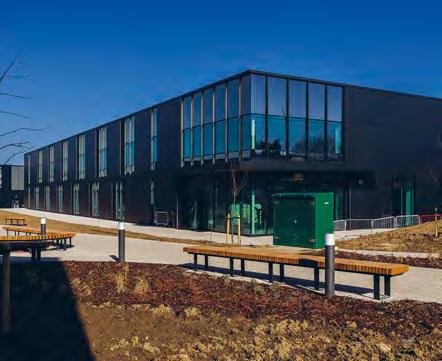
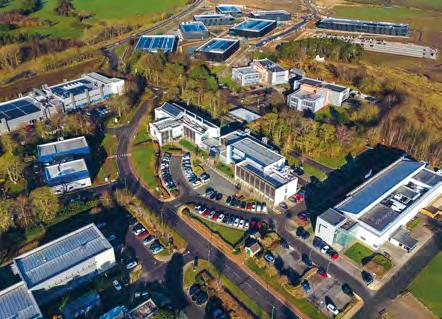
A premier science park driving innovation
Located in Sedgefield, County Durham, NETPark is one of the UK’s premier science and technology hubs, home to a thriving ecosystem of more than 40 businesses employing in excess of 700 people.
From cutting-edge research to commercial applications, companies at NETPark are pioneering advances in life sciences, healthcare, advanced materials, semiconductors, telecommunications, space technology and more.
The expansion represents a £100 million investment that will add 285,650sq ft of laboratory, office and technical space.
The development is home to units ranging from 11,500sq ft to 35,700sq ft, and has been designed to support the needs of high-growth science and technology businesses, enabling them to scale operations without leaving the region.
NETPark has cultivated an environment where start-ups can thrive, with a number of businesses evolving from small ventures into industry leaders.
Among the success stories are Filtronic, aXenic, Dyman and Sustainable Energy Efficient Devices.
Each began as a start-up and have since expanded significantly within the park:
• Filtronic is a leader in the design and manufacture of advanced RF, microwave and mmWave solutions for the aerospace, defence, space and telecommunications sectors. With a long-standing presence at NETPark, Filtronic continues to push the boundaries of highfrequency technology, developing products that enable next-generation connectivity and communication networks.
• aXenic specialises in the design and manufacture of high performance optical components, and has grown to be a leading provider of precision optical solutions for the telecommunications and defence industries. Its success at NETPark has been driven by research and strong industry collaborations.
• Dyman is an advanced diamond materials company, which has leveraged the resources at NETPark to accelerate its growth. The company specialises in the production of highquality synthetic diamonds for applications in electronics, semiconductors and quantum technologies. Its expansion within NETPark underscores its commitment to pushing the boundaries of advanced materials technology.
• Sustainable Energy Efficient Devices is leading the way in developing energy-efficient technologies for sustainable power solutions. By creating ultra-low power sensor systems, it is helping revolutionise multiple industries, including manufacturing, infrastructure monitoring and telecommunications. The company’s growth at NETPark has enabled it to refine its nanotechnology-based solutions and expand its market presence.
One of the key advantages of locating a business at NETPark is the unparalleled support ecosystem.
Business Durham, the business support service of Durham County Council, plays a crucial role in helping companies grow.
Through initiatives like the Finance Durham Fund, businesses at NETPark can access vital
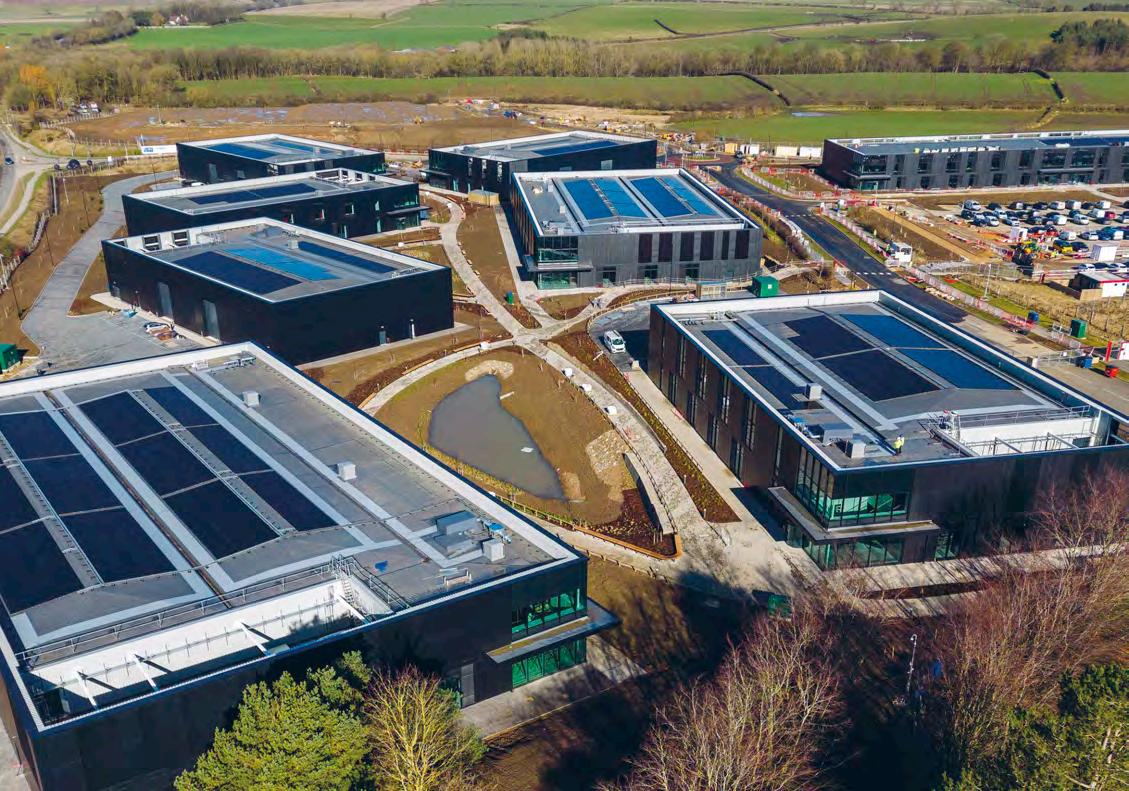
funding to expand their operations and invest in research and development to accelerate their commercial success.
Business Durham also acts as a connector, facilitating relationships between start-ups, investors, research institutions and like-minded businesses.
Additionally, NETPark’s close ties with Durham University and the Centre for Process Innovation provide companies with access to research, development and testing resources.
This collaborative approach ensures businesses remain at the forefront of their industries, with the support and expertise needed to develop breakthroughs.
Supporting business expansion with scalable workspaces
NETPark offers an adaptable environment designed to support businesses at every stage of their growth journey.
From incubation spaces tailored to start-ups developing technologies, to larger, fullyequipped technical environments suited for established firms, the park provides seamless expansion opportunities.
Companies at NETPark benefit from a businessfriendly infrastructure that allows them to scale operations without costly relocations or operational disruptions.
The latest expansion ensures businesses can transition between spaces effortlessly, whether upgrading from smaller office units to high-specification laboratories, or expanding manufacturing capabilities within the park.
The future of innovation at NETPark
With the latest phase of expansion, NETPark is poised to strengthen its reputation as a leading hub for science and technology in the UK.
The park’s continued development will provide businesses with the space, infrastructure and support needed to drive innovation and commercial success.
Companies looking to join this thriving community can take advantage of a dynamic environment that fosters collaboration, provides unparalleled business support and accelerates research and development.
Whether you are a start-up seeking incubation space or an established company looking to scale, NETPark offers the ideal location to succeed.
NETPark
To find out more about NETPark, visit the websites at the top of this article.
Breaking the ground for ground-breaking education
Education Partnership North East www.educationpartnershipne.ac.uk
LinkedIn: Education Partnership North East
Construction is continuing at pace on Education Partnership North East’s new £52 million-plus Ashington Campus, which promises to revolutionise students’ learning experiences. Here, Colin Young tours the site and speaks to Ellen Thinnesen, Education Partnership North East chief executive, and a number of the project’s partners, to learn more about how the development will nurture future generations and provide Ashington with a significant economic boost.
Five years in the making.
Two years of negotiations, funding, sourcing and planning.
One vision.
Where muddy mounds rise tall and a series of holes presently pockmark the ground, soon will stand Northumberland College’s new trailblazing Ashington Campus.
Taking shape on Wansbeck Business Park, on the town’s fringe, the Education Partnership North East-led venture aims to revolutionise learning for the future.
The building site will be transformed over the next two months, as pre-built structures arrive and are made watertight.
By September 2026, the doors will open to three distinct buildings, home to the country’s newest and most innovative educational facilities.
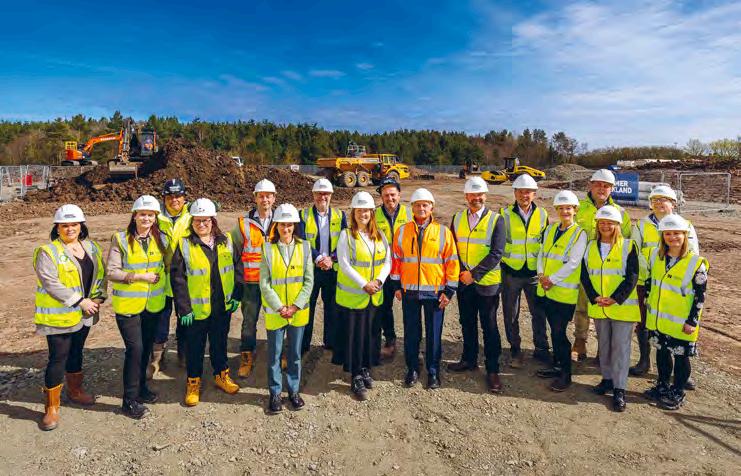
Built by Bowmer + Kirkland on land owned by Advance Northumberland, the pioneering scheme has full approval of the Department for Education and Northumberland County Council.
When completed, the buildings will feature a Technical Centre of Excellence for electrical and mechanical engineering, robotics and automation, civil engineering and groundworks, automotive and green transport, housing and modern construction.
The campus will also include a Student Life Centre and a further and higher education academic and technical ‘heart of the campus’, which will include a specialist hub for young people aged 16 to 25 with special educational needs.
Furthermore, there will be a commercial restaurant for public use, a campus cafe with indoor and outdoor dining, large theatre space, specialist laboratories, industry-standard workshops and immersive learning environments, and space to provide employment, careers, financial, welfare and study support services.
The ambitious project has been spearheaded by Ellen Thinnesen, Education Partnership North East chief executive, who has led the organisation – which also includes Sunderland College and Hartlepool Sixth Form College –through two mergers to assemble one of the largest college groups in the country.
She says: “When we first merged with Northumberland College in 2019, I had conversations with the Department for Education about concerns around the longterm sustainability of the existing site.
“I knew, once we’d done our site surveying and due diligence, that the building wouldn’t stand the test of time for the next 20 or 30 years.
“The Department for Education has been superb to work with, in terms of viewing what

the future could be for Ashington and supporting this transformative project financially.
“We equally owe a huge thanks to Advance Northumberland, which has been great in helping us acquire the land.
“This was a chance to be part of a trailblazer pilot scheme, to think about designing and building schools and colleges in a different way into the future, which incorporates a low-carbon standard in its architecture, design and manufacture.
“That means there are a number of features within the buildings, such as biophilic principles – lots of tree planting, greenery and use of light – so students feel connected to nature.”
The campus’ Technical Centre of Excellence will be home to the School of Engineering, Manufacturing and Automotive, and the School of Construction.
Linked to industry, technical equipment and workshops will be used to train further and higher education students alongside a training centre for vehicle electrification and modern housebuilding.
There will also be the first Ashington School of Health, through a partnership with Northumbria University and Northumbria Healthcare NHS Foundation Trust, which will help create pathways into higher education and healthcare work.
Ellen says: “Our schools of education and childcare; business; visitor economy and commercial industries; sport, exercise and wellbeing; and computing and technology will ensure our curriculum spans a wide range of options, including data computing, cybersecurity, software development and training around business services and business industries.
“Foundational economy training will upskill students in maths, English, digital and employability skills, and provide a direct line to apprenticeships.”
Ellen adds: “The fact we have a diverse range of national, regional and local partners supporting us is phenomenal.
“It’s really exciting to be part of a trailblazing project in the North East.
“The college’s core purpose is to unlock potential, create opportunities and transform lives through outstanding education and training.
“Our future is focused on changemaking and shaping futures for a better tomorrow, and we are doing just that.
“Our college and its brilliant workforce are focused on actively contributing to social, environmental and economic transformation to create lasting, meaningful impact in our communities and beyond.
“This development will bring increased footfall into the town centre and help shape the town for many years to come.
“It is a great legacy.”
Construction of the Ashington Campus comes against the backdrop of Education Partnership North East having secured an ‘Outstanding’ Ofsted rating late last year.
And James Stuart, chair of governors, says the investment will add further momentum to its progress.
He says: “The site is going to change rapidly in the next few months, embodying some of the new construction techniques, and the transformation will be almost unbelievable.
“This modern building isn’t going to make a difference in isolation, though, and it isn’t just about building colleges.
“It’s about the role the college and the facilities will play in the community.”
The blueprint for the campus came before Northumberland County Council’s planning committee in June, and with Ashington’s railway station coming to life as part of the re-opened Northumberland Line, these are exciting times for the region.
Councillor Glen Sanderson, leader of Northumberland County Council, adds: “This county will not just be a UK leader but a world-leader, and this building will drive that.
“Ashington has been unloved for many years, but that has changed, and this will play a huge part in making that change even more sustainable.
“It will raise aspiration, confidence levels and the ability of so many people to be able to get involved and play a leading part in this amazing county.
“I want people to feel they’ve come to the college, got an education and a job, and are then able to help lead industry for the future, for their children and their children’s children.”
Education Partnership North East
For more information about Education Partnership North East and its colleges, its new Ashington Campus and its vast course portfolio, visit the website at the top of this article or call 0300 770 1000.
Working together to make a difference

Collaboration is key to the success of any venture. And through its alliance with the North East Chamber of Commerce, housing association Bernicia is creating opportunities for its residents and supporting moves to transform the North East. Here, John Johnston, Bernicia chief executive, tells N magazine about the benefits of its North East Chamber of Commerce membership, the meaning behind its headline backing for the 2025 Chamber Awards and why other operators should consider working with the business organisation.
Tell us a little about Bernicia and its mission
Bernicia is a North East housing association, which owns and manages more than 14,000 homes across Northumberland, Tyne and Wear, County Durham and Teesside.
We provide homes and services to more than 60,000 residents, employ 600 people and have an annual turnover in excess of £90 million.
During the course of our current four-year corporate strategy, we are investing £230 million into homes and communities – £110 million of that alone into building 800 new homes to tackle the urgent need for more quality, affordable housing.
We are values driven, progressive and proud of the role we play as an anchor institution in the communities where our homes are and our tenants live.
We believe a good home makes lots of other things possible, so we provide great houses and services that do just that.
By listening to tenants and customers, working with partners and supporting opportunity across the North East, we believe we can enhance communities and help transform our region.
As a significant regional business, we know we are more than just a landlord.
We are working closely with partners – including the North East Chamber of Commerce – to influence and help deliver strategic plans to support those championing the North East.
Bernicia is a long-standing North East Chamber of Commerce member. What was the driving force behind your engagement with the Chamber?
www.necc.co.uk
LinkedIn: North East Chamber of Commerce
www.bernicia.com
LinkedIn: Bernicia Group
We’ve been a member for a number of years.
The original catalyst for joining was that we were conscious Bernicia, while respected within the housing sector, was not as widely known across the business community as we would have liked.
Part of our strategic priorities as a major stakeholder and employer are to do more to support the regional agenda and in doing so raise our own profile, to explain what Bernicia does and what we stand for.
How do the Chamber’s goals for the North East align with Bernicia’s ambitions for the region?
We value the excellent work of the North East Chamber of Commerce as the region’s largest and most influential business membership network.
The Chamber really is the voice of business in the region, and champions its success and potential.
This fully aligns with Bernicia’s ambition for the region.
We view the North East as the land of opportunity, and focus on supporting individuals, households and communities in closing inequality gaps through, for instance, boosting employment prospects through our team of employability experts, which help people who are out of work upskill into a job.
We’re conscious of the pivotal role housing plays in providing solid foundations for people and communities, and in supporting the wider economic growth agenda.
The Chamber’s vision and values align closely with ours.

“We believe a good home makes lots of other things possible, so we provide great houses and services that do just that”
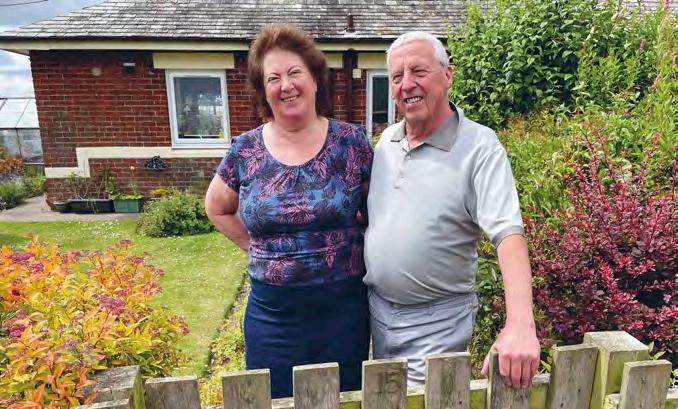
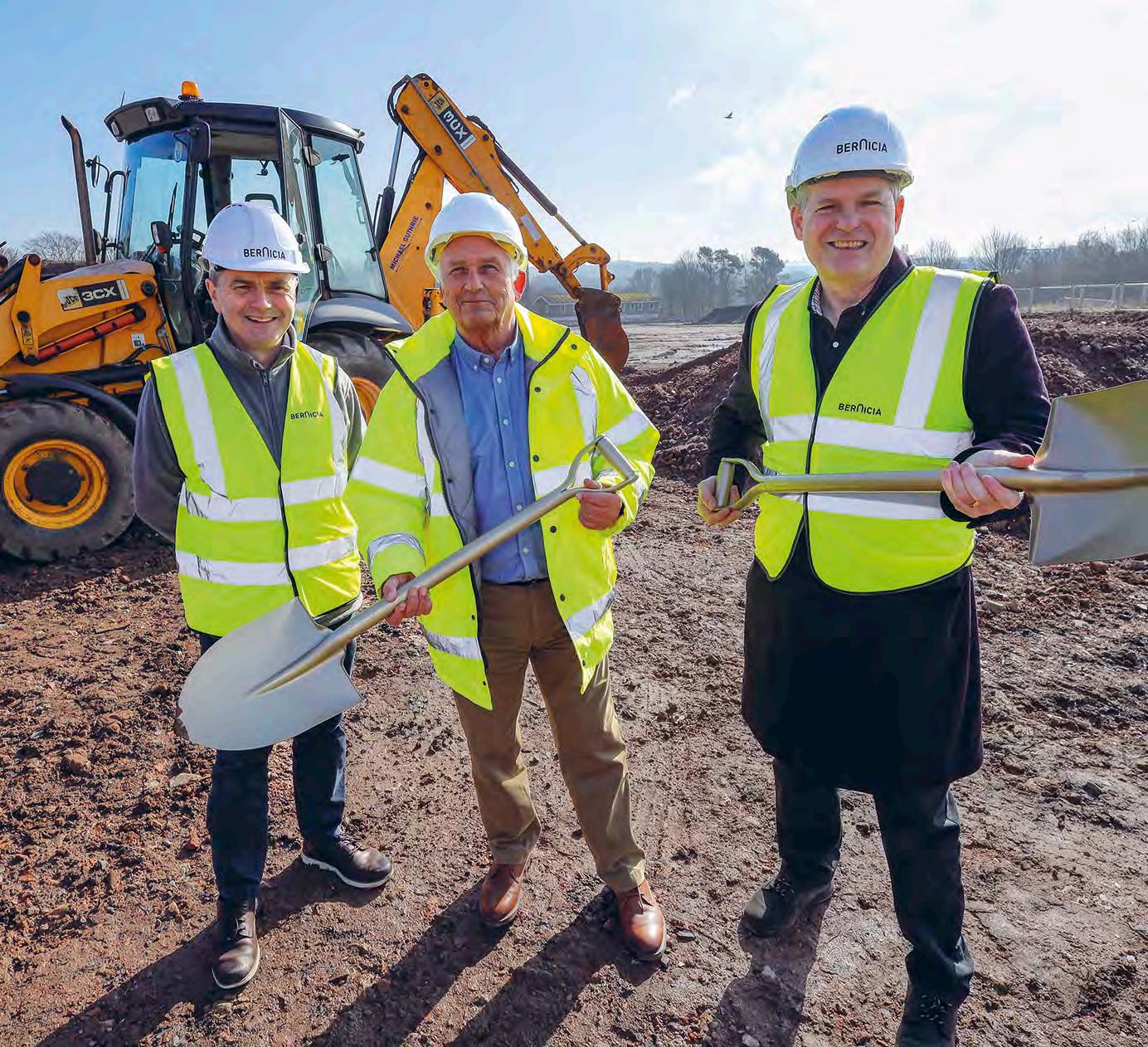
We both deliver on what we say we will do. How has Chamber membership strengthened Bernicia’s support for the residents and communities it serves?
Chamber membership means we can make sure the voice of residents is heard and their needs are reflected in wider influencing of the North East’s bold economic agenda.
We are enthusiastic supporters of the Chamber’s campaigns, which improve business prospects and the life chances of people across the North East, including our tenants.
Networking opportunities with like-minded organisations, facilitated by the Chamber, provide opportunities that benefit all members.
Bernicia is the headline sponsor of the 2025 Chamber Awards in June. The partnership follows the same role as last year, and previous support for Chamber awards celebrations. Why is backing such events so important to Bernicia?
It’s important because it allows us to take time out of our busy working lives to celebrate the success happening right here and now in our great region.
The awards shine a spotlight on our region and our current successes and ambition, showing wider national business markets and the Government the calibre of our business community and the potential of our region.
The wider Chamber network, thanks to chief executive John McCabe and his expert team, is invaluable in getting the story of North East success, and the needs of our business
“The wider Chamber network, thanks to chief executive John McCabe and his expert team, is invaluable in getting the story of North East success, and the needs of our business community, in front of key decision-makers at regional and national levels”
community, in front of key decision-makers at regional and national levels.
And there’s a real feel-good factor around the Chamber Awards.
The strength, depth and sheer resilience of North East businesses is something we can all take great pride in.
It’s inspiring to hear stories of how businesses have scaled heights and overcome challenges from right here in the North East.
And it’s important too, with our fantastic new North East Combined Authority and North East mayor Kim McGuinness, that we support them to deliver their recently published Local Growth Plan.
Celebrating success and recognising and helping unlock the potential of the region is crucial, and these awards play an important part in doing just that.
What advice would you give to other organisations considering becoming a North East Chamber of Commerce member?
Don’t hesitate – join today.
Membership brings so many benefits; it can be member-focused support or wider influencing work to make sure the voice of business is heard.
The Chamber’s business support services help those on a journey to success, while policy networks help grow influence, networking opportunities and reach.
All in all, it is a very wise investment.
North East Chamber of Commerce
For more information about the work of the North East Chamber of Commerce and its membership opportunities, visit the website at the top of this article.
Bernicia
To learn more about Bernicia, visit the website and LinkedIn page at the top of this article.
A shared purpose
Community Foundation www.communityfoundation.org.uk
general@communityfoundation.org.uk @CFTyneWearNland
www.suttontrust.com
LinkedIn: The Sutton Trust
Community Foundation North East was founded on an ethos of improving lives and communities, and supporting people to improve their outlook and address inequalities. Its North East Roots campaign encourages homegrown individuals, who found success outside the region, to give back and inspire the next generation. Here, Chester-le-Streetborn Nick Harrison, chief executive of social mobility charity The Sutton Trust, shares his career path with N magazine and explains the shared DNA between the two organisations.
Opportunity. Potential. A fair chance.
For many young people, the route to higher education or training is relatively straightforward, with all the rewards it can offer.
But for some, often from a lower income or otherwise disadvantaged background, the options can feel limited or out of reach.
Aiming to tackle the barriers to success and improve social mobility for young people across the region is Community Foundation North East, which provides funding to grassroots organisations across the geographies it covers, practical support, mentoring and other stepping stones to success.
It has traditionally been supported by philanthropists based in the North East, looking to give back to their region.
But, with its new North East Roots Fund, the foundation is reaching out to expats who left the area for study or employment opportunities, and have made their mark elsewhere.
While North East Roots aims to secure new funders to support its ongoing charitable giving, it is also an opportunity to build a network of successful and influential people who can give time and expertise to boost the region’s potential.
A new link with Nick Harrison, chief executive of The Sutton Trust, a national social mobility charity, brings together two organisations with potential for shared learning and action in the North East.
Chester-le-Street-born Nick is, in many ways, an example of social mobility in action.
Growing up, his dad was a lecturer at what was then Sunderland Polytechnic, and his mum a teacher-turned-homemaker.
Academically successful, he became the first pupil of Hermitage Comprehensive, now Hermitage Academy, to be admitted to Oxbridge.
After completing a degree in physics at Cambridge, he went on to complete a PhD in light-emitting polymers now used in OLED TV screens.
“Nick Harrison represents so much of what we’re trying to capture in our North East Roots initiative
“The story of his career in business serves as a great example for young people in our region, and the work of the Sutton Trust under Nick’s leadership is hugely impressive – it is directly changing the lives of young people across the country”
John Hollingsworth, Community Foundation chief philanthropy
and development officer

Deciding to leave academia behind, he found his way into business consultancy with global management firm Oliver Wyman.
Nick says: “I didn’t really know what business consultancy was until I applied for the job and got it.
“But it turned out to be something I was good at – I applied scientific methods to business.
“I did well in the role, and progressed up the ranks to global partner, with clients in the US, Europe and Asia.”
After 21 years, he chose to move on, with a brief foray into the world of fashion as an executive –a time he describes as his ‘midlife crisis job’.
Despite opportunities in the world of business and government, he made the decision to join The Sutton Trust, appointed chief executive two years ago.
A national charity focusing on social mobility
and social economic opportunity for lowincome families, the charity supports 10,000 bright but disadvantaged young people each year with a range of university and career access programmes.
The charity also carries out research, policy and advocacy work, from birth to the workplace, working to understand the barriers to opportunity that exist for young people from low-income families, and the solutions to tackling them.
Although based in South London, he has strong family links in the North East, with his dad and sister, plus a number of school friends, still based in and around Chester-le-Street.
He also made a professional return to the region earlier this year, as a panellist in debates hosted by Newcastle University examining how access to education and employment can be improved in the North East.
Nick says: “I have such passion for the North East but, it has to be said, the region faces lots of challenges – it has entrenched child poverty and lower academic attainment than some areas, leading to lower access rates to university.
“I look at the region and think, ‘how can I play my part to enable the talent we have in the
region to be as successful as possible?’
“The North East was once the epicentre of the global economy – can we get back to that place?
“We do see growth and opportunity in the North East, certainly in pockets.
“Newcastle is a modern and vibrant city, as is Sunderland.
“But, equally, you see some places just outside those cities that are pretty challenged with dying high streets.”
Nick highlights the shared DNA behind the Community Foundation and The Sutton Trust –a passion for empowering and enabling people to be as successful as they can be.
The Sutton Trust hosts young people from the wider North East region in its programmes, including annual summer schools in universities across the UK, to allow those from disadvantaged backgrounds to experience academic life.
Nick acknowledges his own luck and privilege at being able to attend a leading university and move into a successful commercial career, although he points out it was necessary to leave the North East to do so.
He says: “When I was leaving sixth form, I didn’t
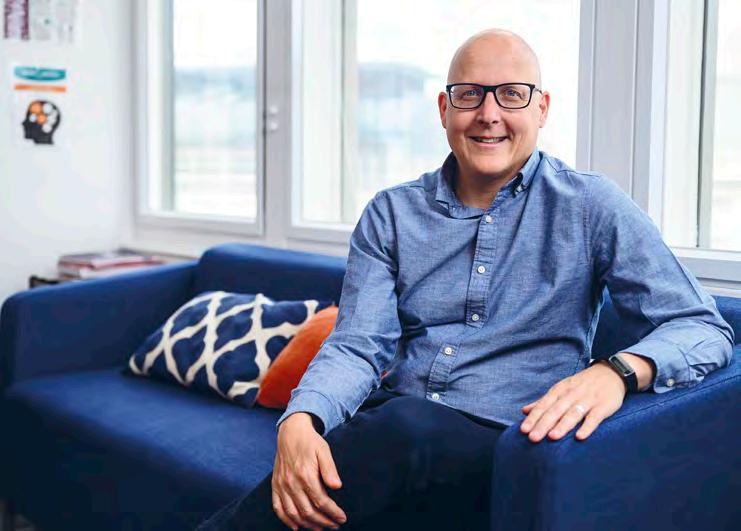
think too much about my career or being the first to go to Oxbridge – I just followed what I thought was interesting.
“Arguably, I couldn’t have done what I have done in my career, particularly the business consultancy, if I’d stayed in the North East – the job opportunities were in London.
“To an extent, that’s still the case for those sort of roles – if you’re running a global business consultancy, you’re realistically doing it in the heart of London.
“The North East has some fantastic businesses and universities, and for me, it’s about giving young people a choice.
“They need the right insight and backing to make up their own mind about whether they stay in the region, move away for opportunities elsewhere, or go off and experience life outside of the region and then come back again.
“I also think it’s just as important to look at how we can persuade people from elsewhere in the country to move to the region, to bring in talent and experience.
“The North East has some fantastic young people.
“And with the right support, they can do amazing things.”
Community Foundation
To find out more about the Community Foundation, its work and how you could support the North East Roots Fund, visit the website or contact the email address at the top of this article.
Moving on up: How embracing internal mobility can supercharge your business
Muckle LLP
www.muckle-llp.com
LinkedIn: Muckle LLP
You may have encountered the phrase ‘internal mobility’ at some point in your professional journey. But what does it mean, and how can it help your business thrive in 2025? Here, leading law firm Muckle LLP highlights why all businesses should foster a culture of internal mobility.
What is internal mobility?
Internal mobility strategies offer countless benefits to businesses, from ensuring better service continuity to driving innovation.
It’s about employees moving to new opportunities within their organisation, allowing them to advance their careers and make a substantial impact.
According to LinkedIn’s 2025 Workplace Learning Report, more than half of organisations ranked highly for their career development maturity see internal mobility as a high priority in the year ahead.
Additionally, companies capitalising on internal mobility strategies see 20 per cent lower turnover rates and significantly reduced hiring costs while driving employee engagement.
Empowerment fuels success
Muckle is no stranger to internal mobility and championing professional development.
Most recently, following an exciting period of growth, the firm announced four key promotions within its senior leadership team.
Anthony Evans, who joined the firm in 2015, became managing partner on April 1, following previous managing partner Jason Wainwright’s planned decision to step down after ten years.
Philip Clare began his Muckle career in 2005 as a trainee solicitor, and has now been appointed head of corporate finance.
Following two prior promotions, Gail Bennett has become head of the real estate team, with Joanne Davison moving to become head of the sports, education and charities team after almost 23 years at Muckle.
The four have a wealth of experience and a strategic vision that comes from having had
several different roles within the firm, and are ideally placed to promote the firm’s growth.
Shaping company culture
Muckle’s leadership promotions reflect the positive effects of investing in people, including prolonged tenure, heightened employee engagement and the continuation of excellent service.
Managing partner Anthony says: “Our people are fundamental to our business; we are proud that everyone in the firm is supported and enabled to develop professionally, so they can realise their potential and have a great career at the firm.
“I’m delighted to welcome Philip, Gail and Joanne into their new roles; three fantastic lawyers and leaders who have already made a massive contribution to the firm.
“Their expertise, dedication and deep understanding of the firm will enable them to be hugely successful in their new roles.”
Service continuity
Internal mobility benefits clients, as well as employees.
Employees who gain an in-depth understanding of a business and specific industry through years of service ensure better service continuity.
Investing in internal mobility can help businesses maintain outstanding client relationships and ensure they deliver the best service possible.
Closing skills gaps
By focusing on individuals’ development and employee retention, Muckle has built an agile
workforce and accelerated skills development within its teams.
Offering teams opportunities to upskill, tackle new challenges and progress to leadership roles can help bridge skills gaps quickly and develop a workforce that welcomes continuous learning and growth.
Keeping up with industry demands
With evolving industry demands come new challenges.
In Muckle’s experience, when teams are supported to learn and succeed with the right opportunities, they are able to develop and provide creative solutions for clients.
Internal mobility drives innovation, as employees are given the opportunity to take on new projects, flex their creativity and ensure the business can stay competitive.
Investing
in people
Empowering employees to feel appreciated and encouraging them to grow professionally can be highly valuable.
Creating a culture of trust and support, where
employees feel driven to succeed, helps unlock their potential and boost retention.
When employees see opportunities for progression, it can also positively impact motivation and morale, creating a desire to continually improve.
Anthony adds: “Helping everyone in the firm see how they can develop their careers is something we have always prioritised, and is key to our values.
“I am sure this has helped us to retain our people but, more importantly, it allows them to develop and realise their potential.
“We’ve seen the positive impact internal mobility has on our people, our work and our clients, and we will continue to champion the skills and dedication of our people as we look to the future.”
Whether you want to facilitate learning and development or create opportunities for progression within your company, there is no disputing the benefits of investing in internal mobility.
At a leadership level, promotions and continuous development help businesses retain first-rate talent, utilise in-depth knowledge and drive success.
Muckle LLP
To learn more about Muckle’s investment in its people, as well as the legal services it provides, visit the website at the top of this article.
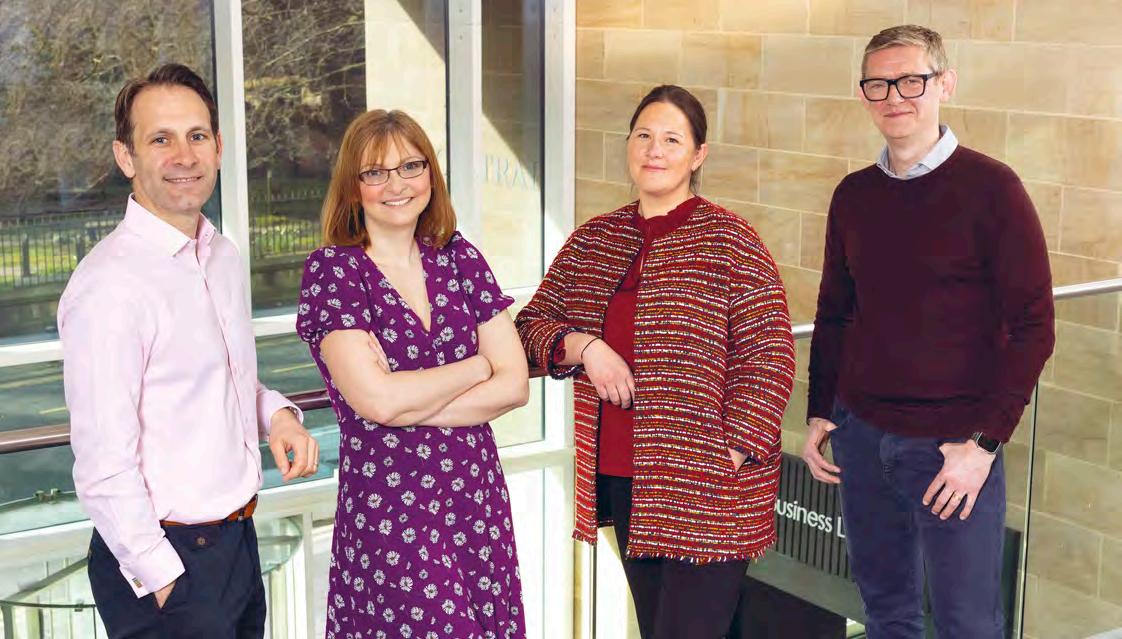

www.fearlessadventures.co.uk LinkedIn:
Dominic McGregor was the co-founder of Social Chain with Dragons’ Den star Steven Bartlett, making friends and fortunes before selling the company five years ago. Now, with his new investment fund Fearless Adventures, Dominic and his partners are looking to help the entrepreneurs of the future and bring their academy for founders to the North East. Here, Colin Young speaks to Dominic to find out more.
It started with a tweet.
Before Twitter became the unpleasant hunting ground it is today, Dominic McGregor was a hard-up sports science student at Edinburgh University, facing that decades-long dilemma... He’d run out of toilet roll.
But he was never going to run out of ideas. Most people might head to the corner shop.
Dominic decided to create the ‘Student Problems’ account – laying the first brick in the foundations to making his fortune.
He says: “The idea was to share some of the things I’d noticed about life at university.
“Like realising how expensive cheese is for the first time; how we prepare to drink with predrinks before we go out drinking – just student life and a little bit of fun.
“After 400 tweets, I had 400 followers, but then it went to about 10,000 followers in a week.
“I very quickly realised this was something, and then, like any desperate student does, I tried to think of a way to make money from it.
“I put an email address in my Twitter bio, and got a couple of emails in the first couple of weeks as the page grew quickly to 50,000 followers.
“One of them was a guy called Steven Bartlett…” Now a well-known Dragon from the Den, and host of The Diary of a CEO podcast, back then
the entrepreneur had just launched Ball Park, an online messaging board, also aimed at students, having dropped out of Manchester Metropolitan University after just one lecture.
The pair agreed to meet in Dominic’s home city of York, where he’d attended Bootham School, and also played as a young goalkeeper of some promise.
He says: “We went for a drink at Revs.
“He asked me what my plans were with ‘Student Problems’, and what I was trying to build, and I’d never really thought about it being a business.
“I’d just thought about it as a way of making a bit of money.
“We spent two hours together, and then a couple of days afterwards talking, and he saw what I was building as the marketing arm to what he was building, and he said to me, ‘logically, you should drop out of university, and we should do this full-time together’.
“The next day, I rang my parents and told them.”
It wasn’t an easy conversation, and his parents Brian and Louise have subsequently admitted they knew they could back his entrepreneurial spirit, even if it was not the outcome they’d expected from his private school and university education.
Dominic says: “I’m blessed with two very supportive parents.
“We mitigated all circumstance and risk by it
being a year out initially, with the ability to go back afterwards.
“I’m very grateful I had the opportunity to try something and test myself with a full security blanket underneath me in my parents; I’m very lucky I had that.”
Dominic and Steven set up Social Chain, with the latter also working from his parents’ home in Plymouth.
But they were forced to stop paying their own salaries within four months, and when the next academic year loomed, Dominic knew he had to decide on whether to return to his studies in Edinburgh.
He says: “I waited until the last minute.
“I rang the university the day before I was supposed to go back, and said, ‘I’m not coming’.
“It was touch and go, but it wasn’t a great leap; I didn’t want to go to university because I believed in what we could do.
“Steven did too, and he wanted to move out of his house in Plymouth.
“So, we put as much work in as we could to turn it into reality.
“And we had a very fortunate occurrence of events, which basically allowed it to be realistic, but a lot of it came from desperation.
“By the September, we had a client in London, who was paying us handsomely.
“But we were sleeping in their offices in central
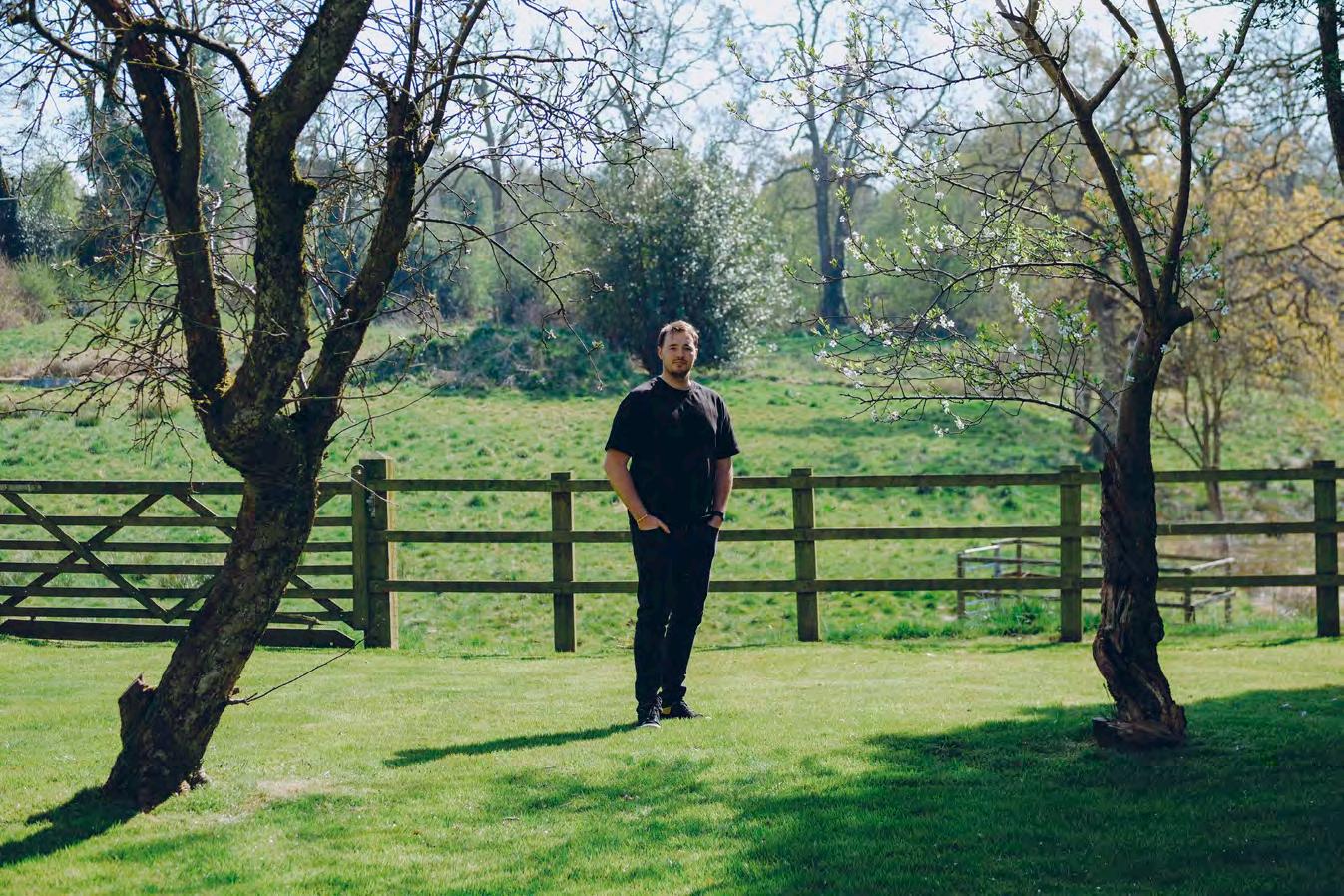

London, waking up at 7am, going downstairs to the shower block – I’d go in the left one, he’d go right – then go back upstairs to work.
“We slept there for three months, literally living in our client’s office.
“They knew all about it; they were a cool startup and were OK with it.”
The pair started to build Social Chain, pioneering the use of social media commercially and driving online traffic as e-commerce businesses started to grow.
Dominic says: “We were in a very fortunate position at a very good time when the entire world started to look at social media and wanted answers.
“There aren’t many situations when you can walk into a room after doing something for two years, at the age of 20, and sit down in front of people who have much more experience than you, and say, ‘I’m an expert in this’.
“But social media was one of those situations, and we were very well positioned to support businesses wanting to grow on social media.”
Social Chain grew into a £300 million global marketing leader, with more than 700 employees and big name clients such as Apple, Amazon, McDonald’s and the BBC.
Dominic tells a compelling story – incorporating his life’s ups and downs – and is a confident, competent and regular speaker in business, as he will demonstrate when he appears before the Entrepreneurs’ Forum in Newcastle later this year.
He says: “We were lucky enough to work with Domino’s.
“And Spotify was one of our first clients too.
“It sounds fantastic now, but back then, they were a start-up, so they were trying everything and going really big on the student space.
“Our logic was we had the student accounts, and if we could mirror what we had in the student space, in football, gaming, food and fashion, we’d effectively be able to five times our revenue, because we’d work with clients who wanted to reach that media.
“We became one of the most successful social media agencies in the UK, with offices in the US and Germany – we took on investment from a family office in Germany to continue our expansion and continued running that business until 2020 when COVID-19 hit.”
After taking the company public in 2019, they quit a year later.
Steven became a Dragon, Dominic turned his attention to a new venture: Fearless Adventures.
But they remain close friends.
Dominic says: “Steven has the same hat, the same look, but he wasn’t the Dragon you see today.”
Not every aspect of Dominic’s journey has been positive – even if he has turned his excessive drinking into one.
He’s written a book – I’m Never Drinking Again – based on his experiences at the height of Social Chain’s success, when alcohol became a dependency, in good times and bad.
He says: “I massively advocate young people testing themselves, growing, building resilience and putting themselves out of their comfort zones.
“But I also massively advocate sense checking, whether you’re still sane and having healthier coping mechanisms.
“My coping strategy was drinking alcohol and trying to numb and forget about things but, unfortunately, that’s not a healthy long-term habit.
“I really pushed myself to the limits in terms of my body, mental health and wellbeing, without actually ever tackling the cause – and there were trigger points – but I think my downhill spirals properly lasted for nine months, where everything started to fall apart.
“I was at breaking point where people around me, including Steven, had to say, ‘it’s time for you to seek some help’.
“And when I went to see a therapist, she said to me, ‘you should stop drinking’.
“I’m very aware of the impact poor mental health can have on someone, because I’ve experienced it first-hand.
“I don’t want people to go there.
“But, on the other side of it, I’ve also seen what pushing yourself to the extreme can do for the positive.”
And with that in mind, Dominic knew he wanted to help founders on their business journeys by sharing his knowledge and experiences from Social Chain.


He set up Fearless Adventures with fellow entrepreneurs David Newns, one of the youngest-ever FTSE 100 executives in the UK; and Charlie Yates, originally a solicitor at George Davies, who set up corporate finance business Contrado and has advised on £1 billion deals.
So far, Fearless Adventures has invested in eight businesses, providing funding, marketing expertise, operational support and guidance to help them scale.
Dominic says: “I have two missions that I wake up every single day and try to deliver on.
“At Social Chain, we supported entrepreneurs to grow their business through marketing, and had great times helping them scale their companies in meaningful ways.
“But one thing that always frustrated me was that we would take a percentage of that growth as a fee, rather than having a shared interest with the brand.
“So we launched an investment firm to provide marketing but also provide support for that founder on an equity relationship, rather than a fee-based perspective.
“That’s where Fearless Adventures came from.
“It is about the word fearless; it’s about founders being bold and supportive, and about young people being fearless when it comes to their careers and life choices.”
An additional arm of Fearless Adventures is its awardwinning training and education academy, which offers government-funded Skills Bootcamps, and has already helped more than 800 people into highly-skilled digital marketing careers.
Dominic says: “When we started Social Chain, our first 20 hires were just a bunch of misfits.
“Nobody would ever give us a job.
“There was nobody with any experience of TV whatsoever, because they were all people who just
started social media accounts, but we put them all in one room, and we made something happen.
“As I grew and started to understand how recruitment processes, hiring managers and companies worked, I understood everyone wants to hire good people.
“A lot of people play safe when it comes to hiring people, which makes no sense for a lot of reasons.
“I was very passionate about launching an academy scheme – and I’m very blessed to work on things that mean a lot to me.”
Dominic and his team are now looking to expand the academy into other areas, including the North East.
He says: “Our ethos is much better than a lot of training providers, because we are industry-led.
“The people delivering the teaching are still on the tools.
“If we train 100 people in the North East over the next year, each of them will be guaranteed a job interview upon graduation.
“That’s not just a win for our learners, it’s a way for us to actively support businesses in the region to build stronger, more diverse teams.
“By connecting with companies looking for talent, we’re helping them tap into new perspectives and develop a deeper understanding of the ecosystem.”
Dominic adds: “We have a very limited time to get close to the best businesses from an investment perspective – if they’re really good, they’ll raise money.
“The closer you get to the early-stage founders here on the ground, the better chance you have.
“The idea is that these people will be the marketing directors of the future, the founders of the future, the managing directors of the future.
“That’s why we’re doing this.”


LAST WORD
Closing this edition of N magazine, John McGee, managing director at critical power infrastructure and modular data centre firm Durata, highlights the business’ recent growth, its crucial role in the artificial intelligence boom and how its Teesside roots are continuing to drive the company forward.
www.duratauk.com
LinkedIn: Durata
The business recently expanded with a number of appointments. What prompted the recruitment drive, and how has it strengthened operations?
We are scaling fast – and for good reason.
The demand for cloud services, data storage, smart devices and high-speed connectivity like 5G is exploding.
Every business, from start-ups to global giants, is continually expanding and improving digital infrastructure, and data centres are the backbone of this transformation.
The advancements in artificial intelligence are also playing a massive role.
That is why the data centre industry is on the brink of a boom.
Data centres provide the critical power and solutions needed to keep operations running, customers connected, lost revenues limited and security risks avoided.
We’ve all seen the high-profile examples in recent months where failures have occurred, like the Heathrow delays, Lloyds Bank outages and the PlayStation network shutdown.
That’s where we come in.
We are at the heart of the critical power and data centre ecosystem.
And just like businesses are future-proofing by investing in our solutions and expertise, we’re future-proofing by investing in our team.
Our senior leadership team is expanding, our team is growing by the week and we’re ready to take on what’s next.
As you allude, artificial intelligence is becoming increasingly integral to daily life. And the Government – through the AI Opportunities Action Plan – has pledged to further embed it into UK infrastructure. How do you view the blueprint, and what opportunities does it present for Durata?
This is an exciting time, not just for Durata but for the entire UK economy.
The artificial intelligence boom is creating jobs and strengthening our global competitiveness.
We are on the crest of a wave, and it’s already revolutionising industries and improving daily life.
Every single use of artificial intelligence, from looking up a recipe idea on ChatGPT to programmed robots on a Mars space mission, needs data processing capabilities.
And the Government’s commitment is welcomed, with hopefully more to come.
The opportunity is huge; we’ve already seen new business, and there is so much more on the horizon.
Durata operates from Tees Advanced Manufacturing Park, a key hub within wider developments across the south of the region that include Teesworks, which is turning former steelworks land into clean energy space. What momentum is building across Teesside, and how is it helping drive Durata’s growth?
We are proud to have our headquarters at Tees Advanced Manufacturing Park.
Teesside has a rich industrial history and a strong community spirit.
And momentum is building; Middlesbrough is the UK’s fastest-growing tech hub outside London, and there is huge investment in logistics, a freeport and Teesside International Airport too.
All of this has helped us expand our customer base across the UK, US and Europe, where we have an office in Frankfurt.
Teesside University is becoming a key player for tech degrees, attracting students from across the globe to Middlesbrough.
We also strongly support local apprenticeships, and are looking forward to more coming through the ranks soon.
We are scaling at pace and creating high-quality jobs with longevity and scope to grow.
We will continue to passionately play our part in the growth of Teesside, putting it on the map on a global scale within the data centre and critical power industry.



